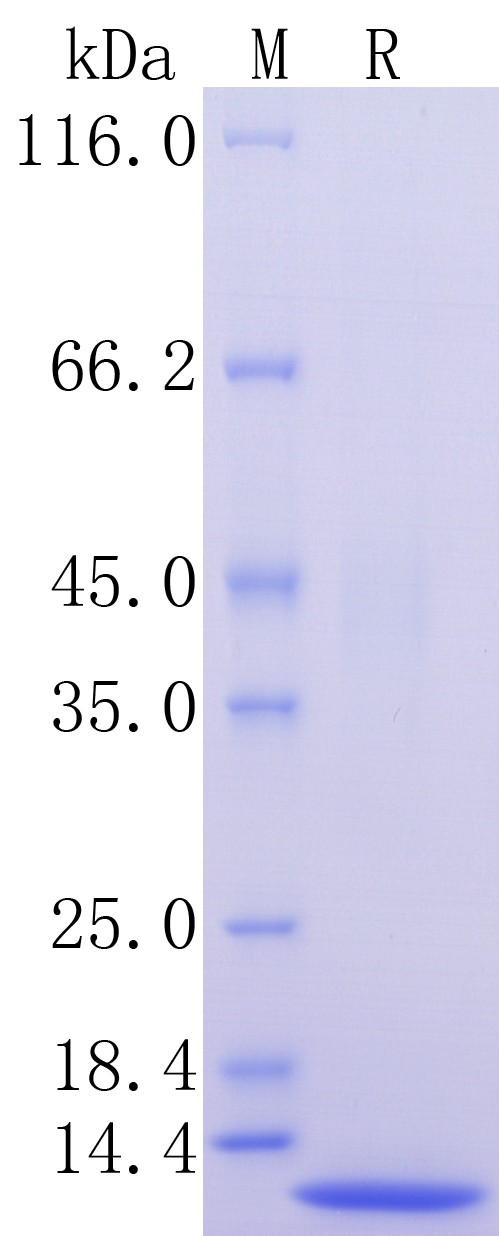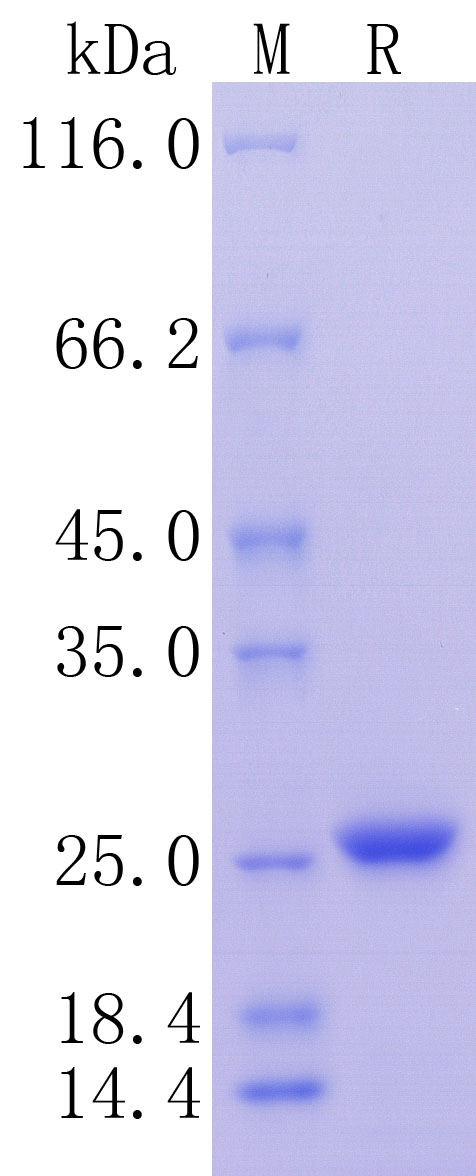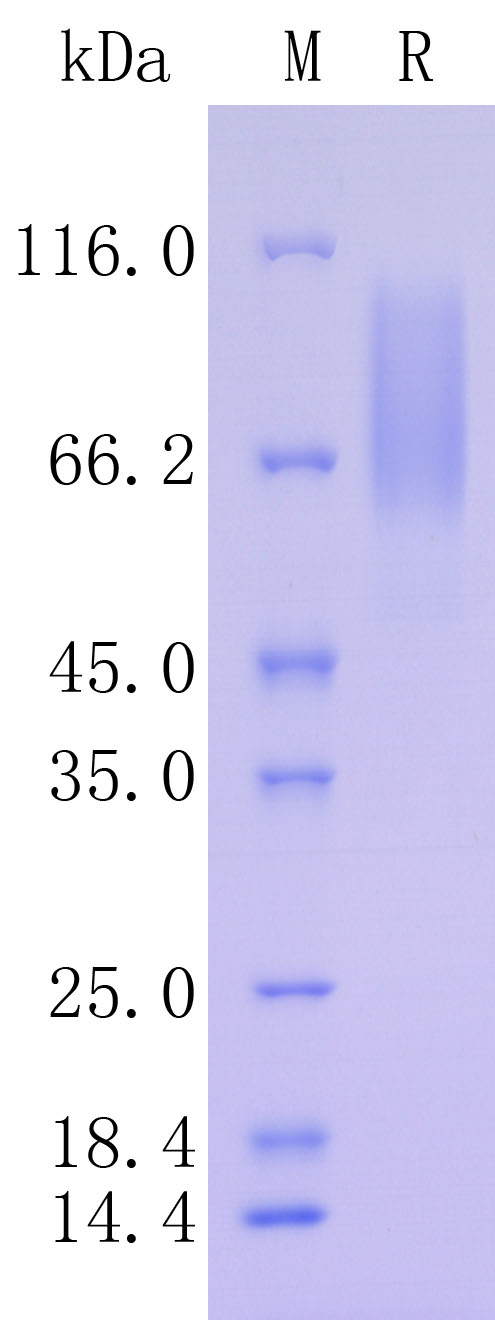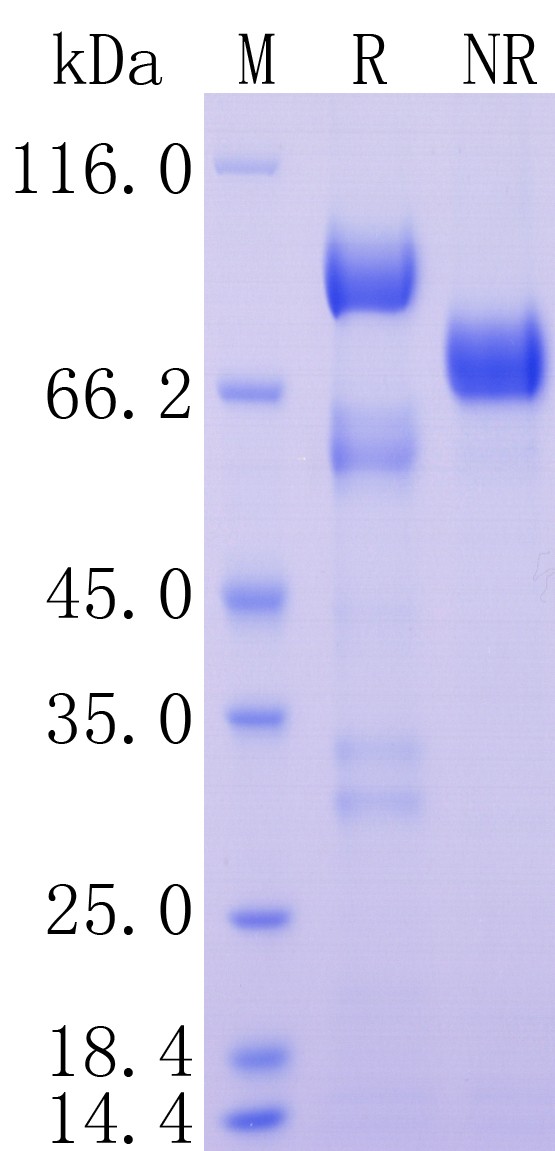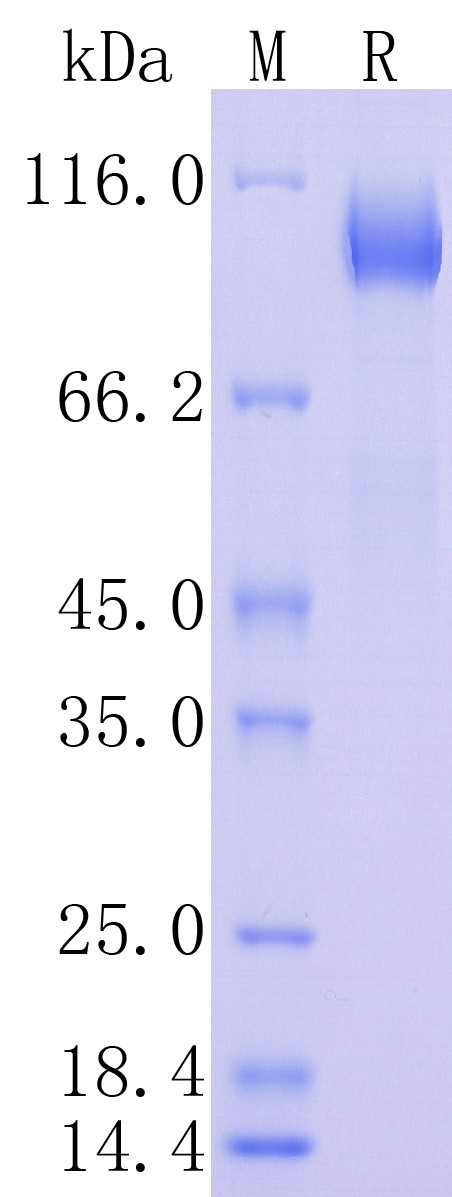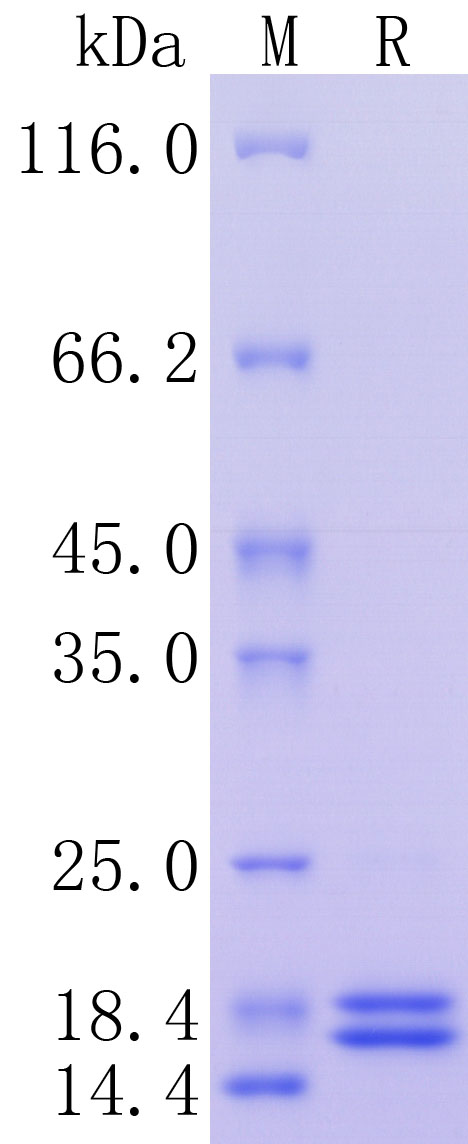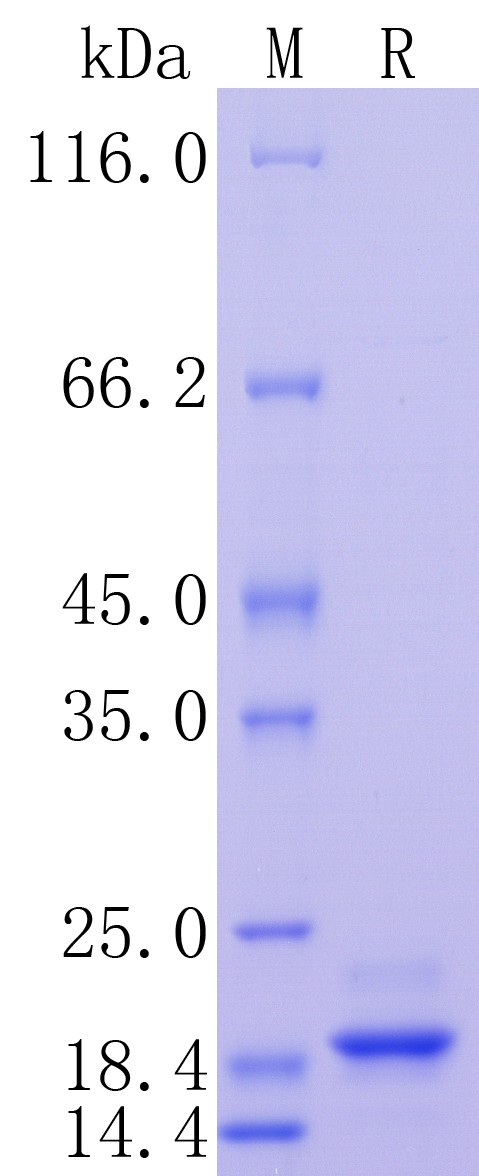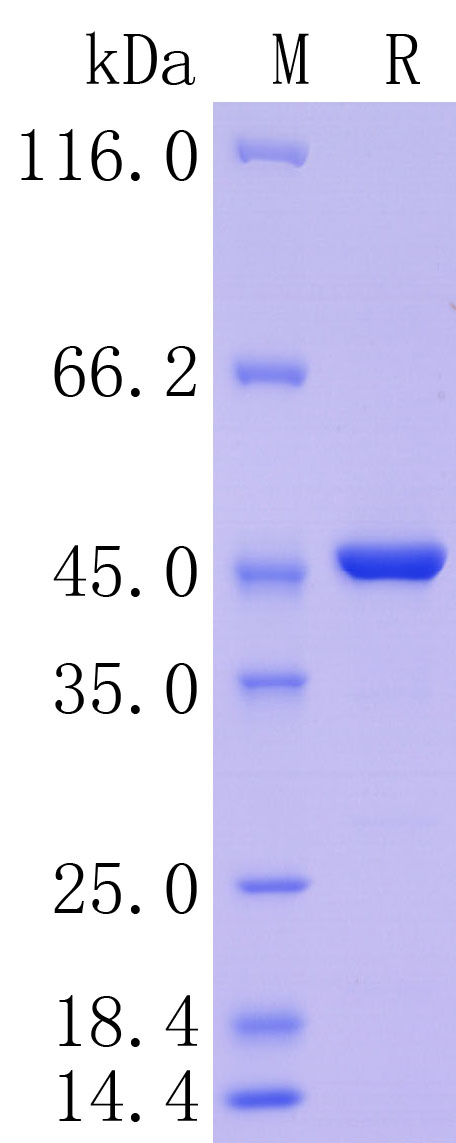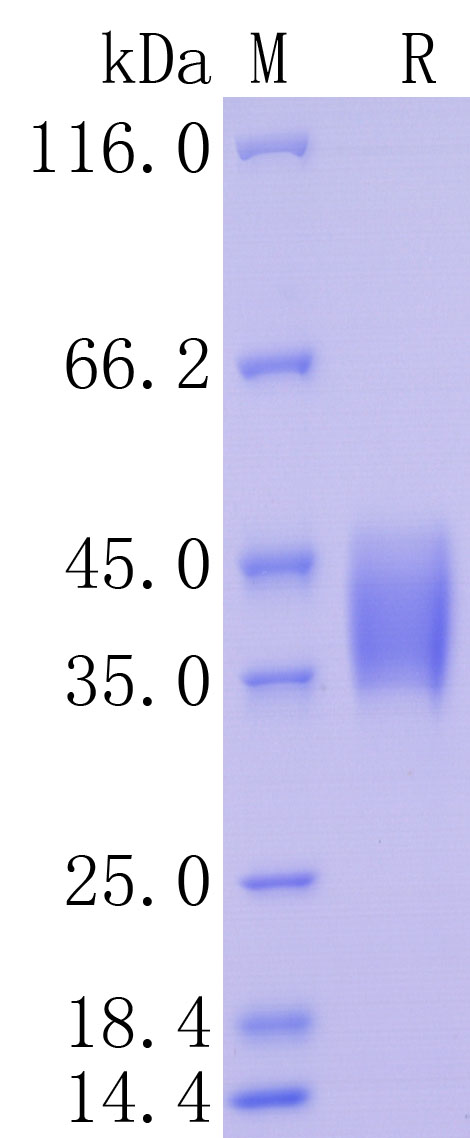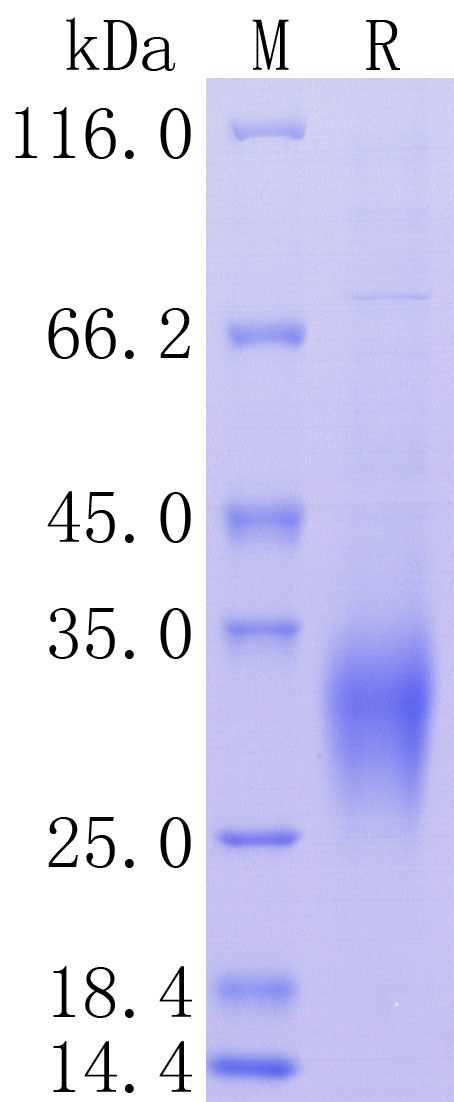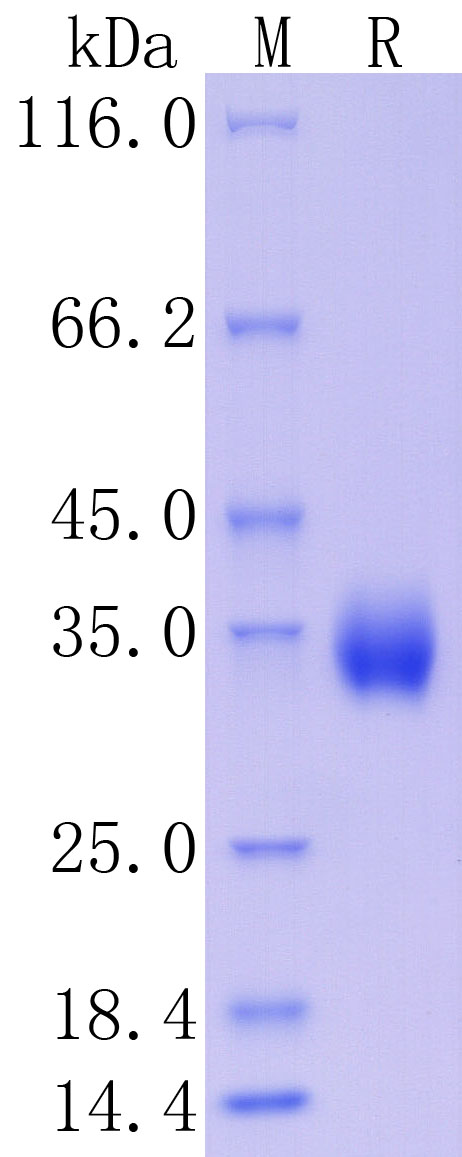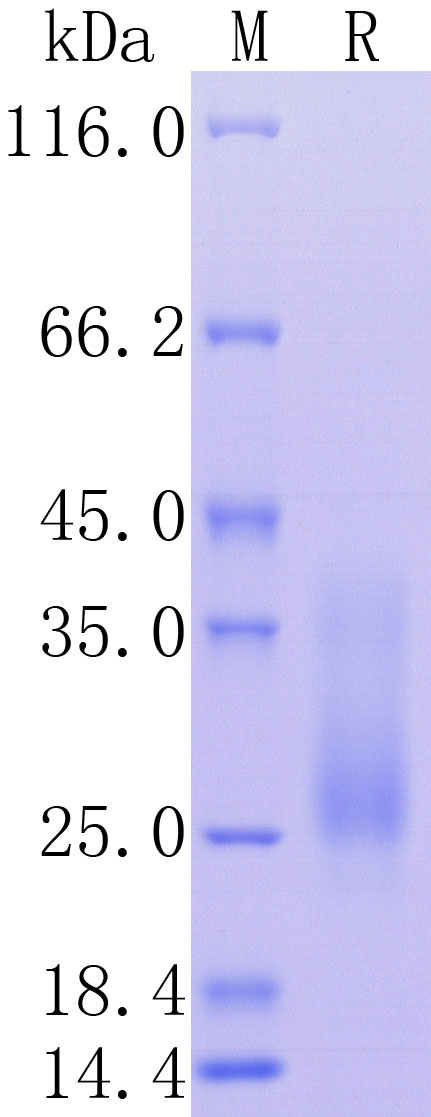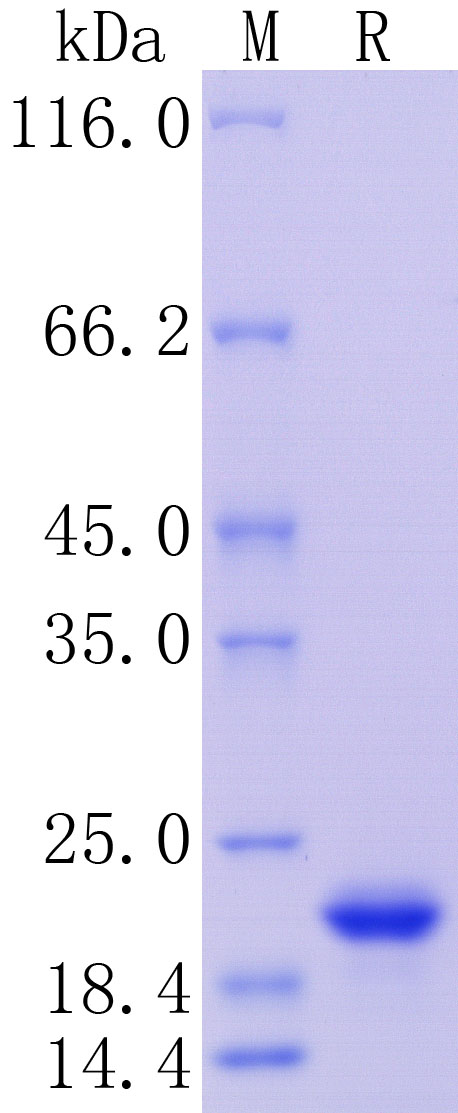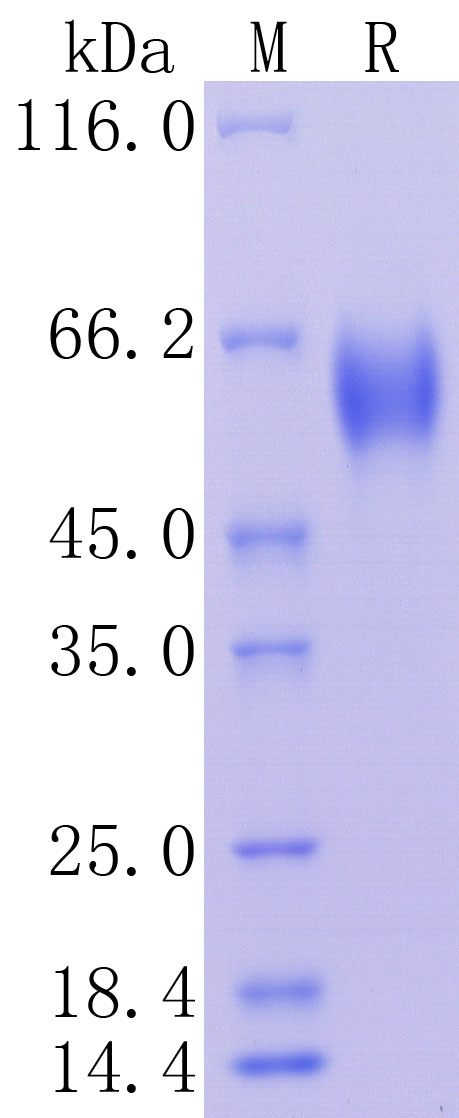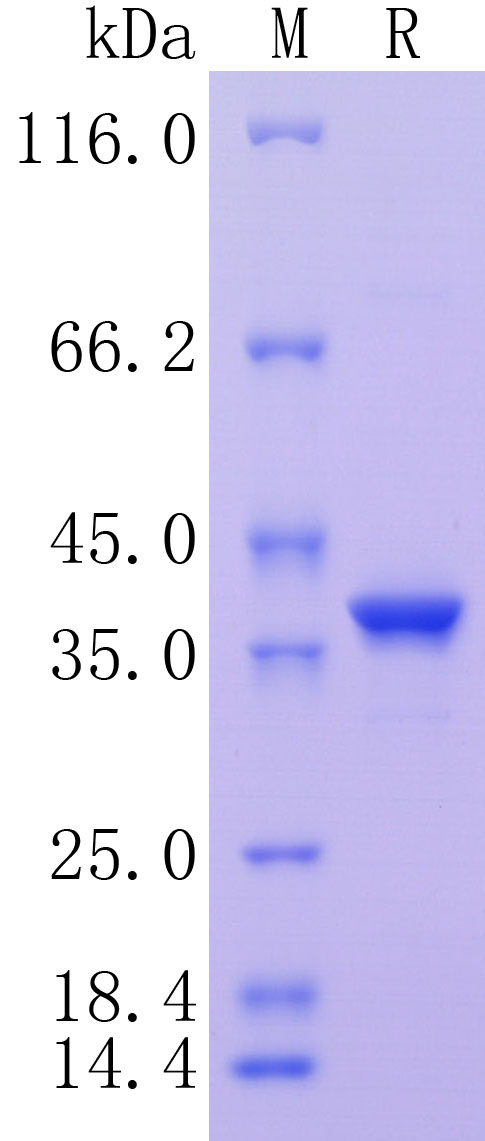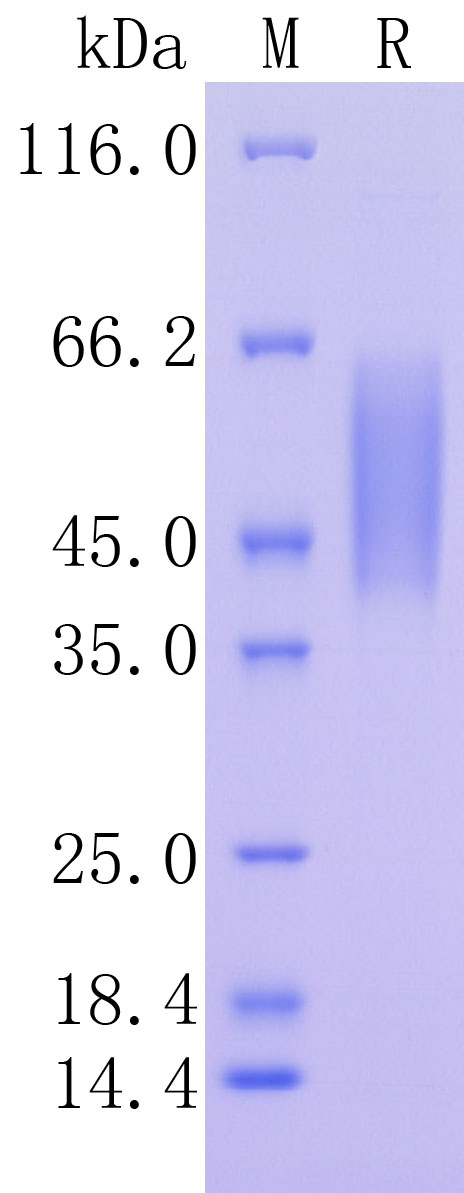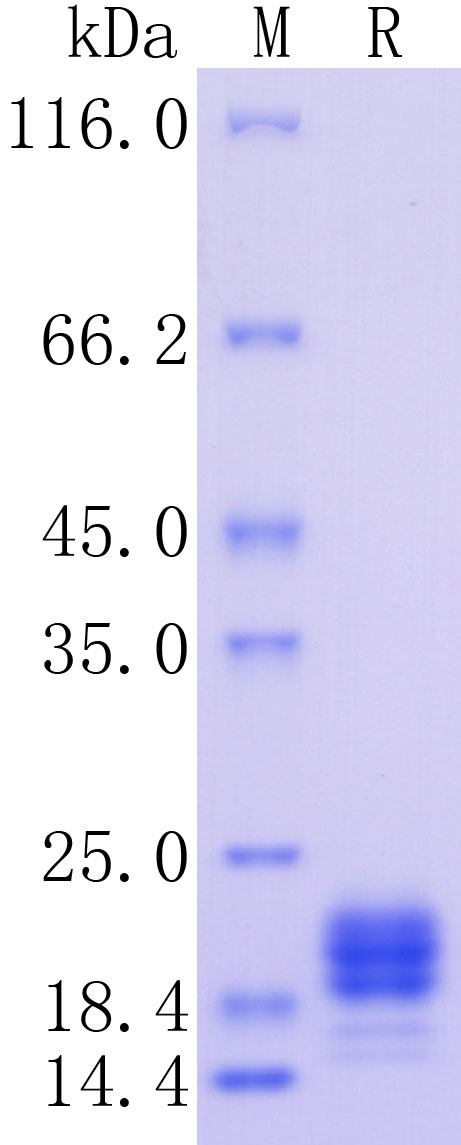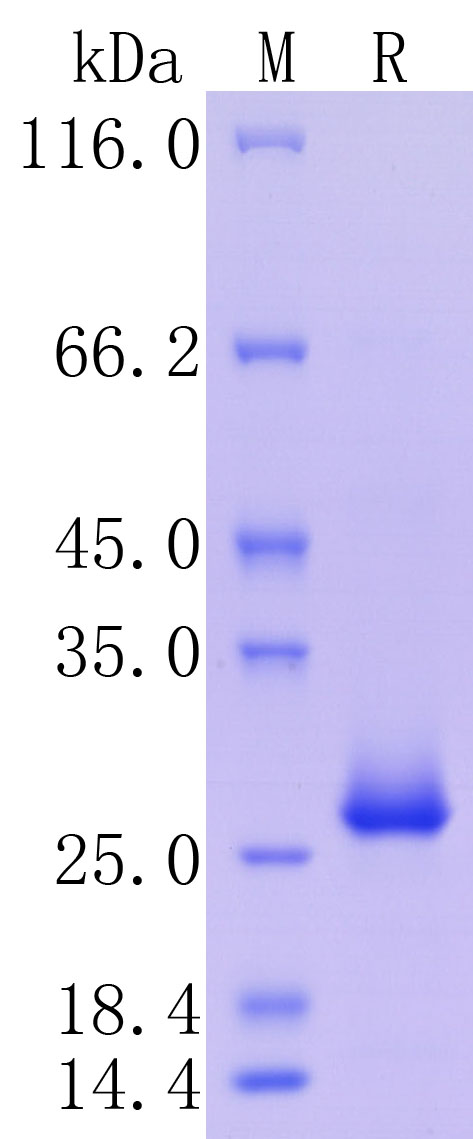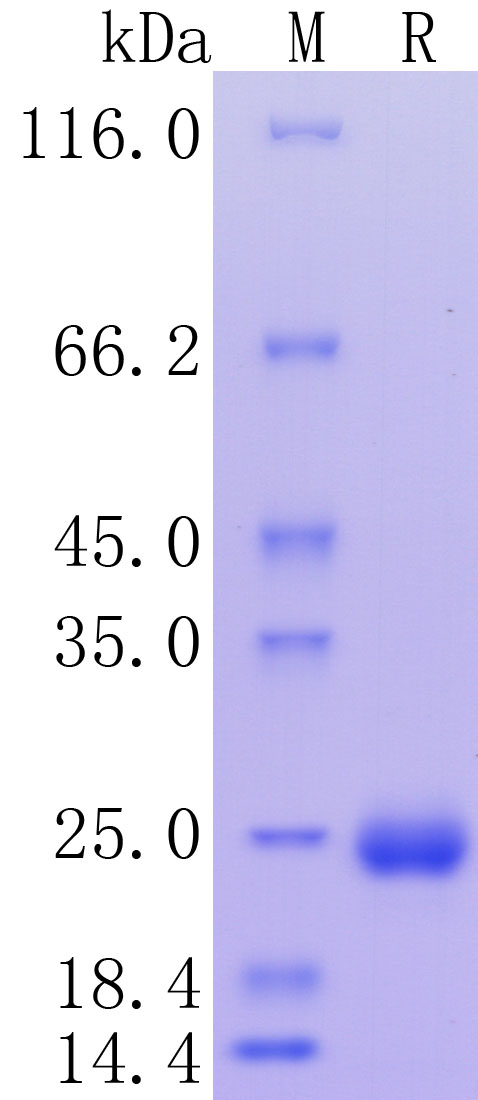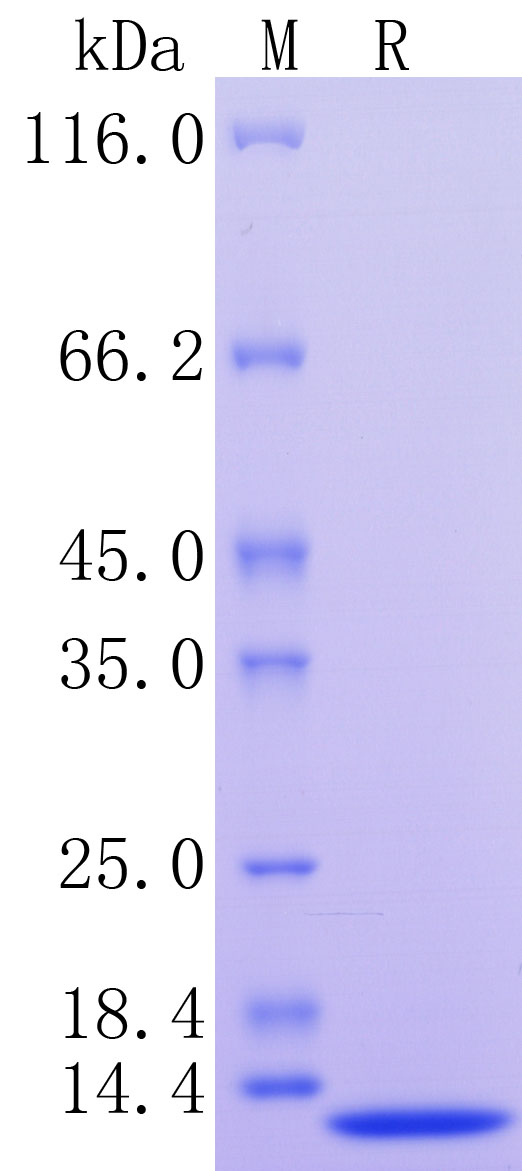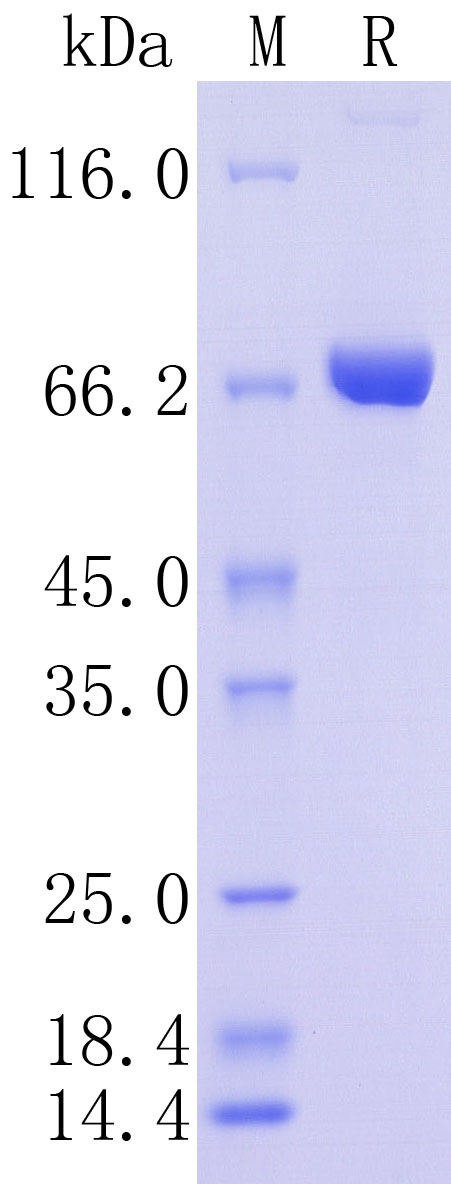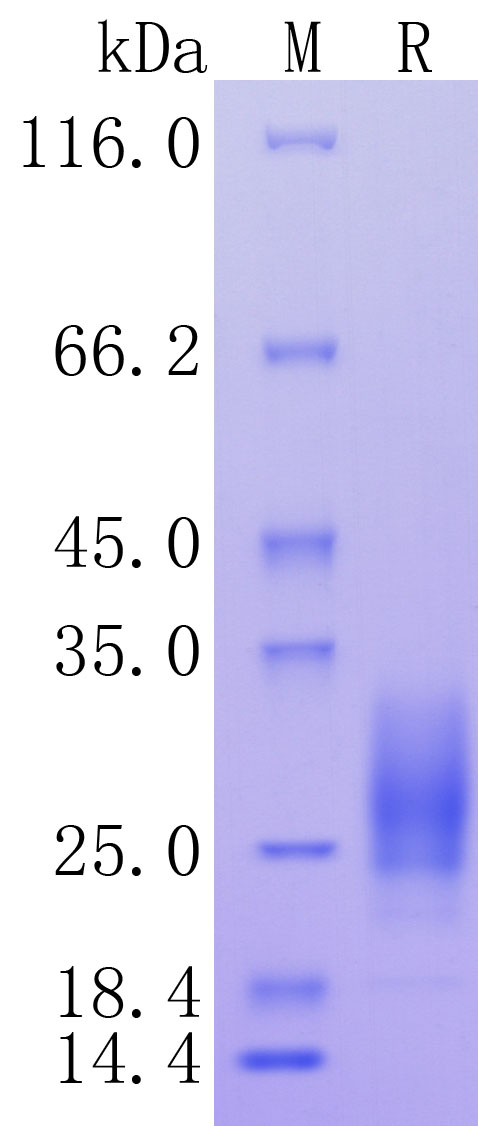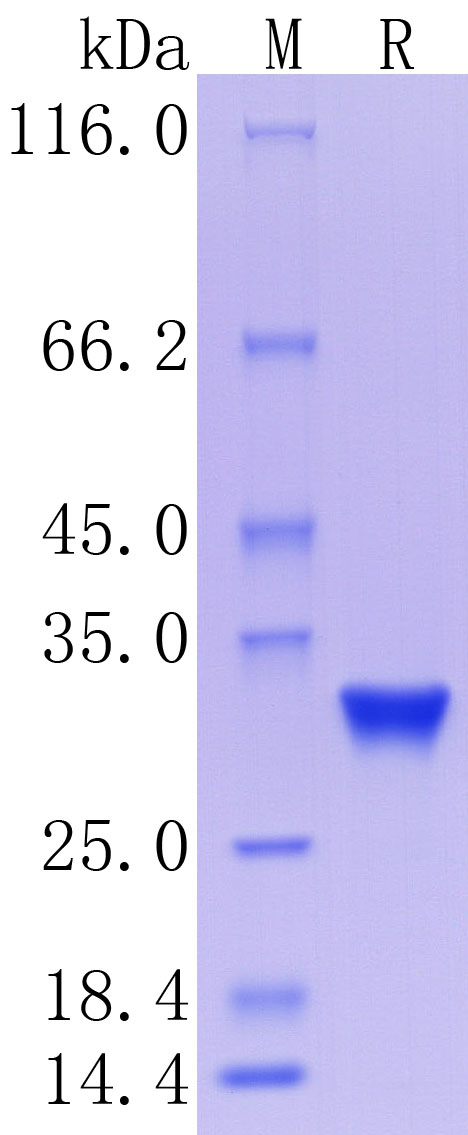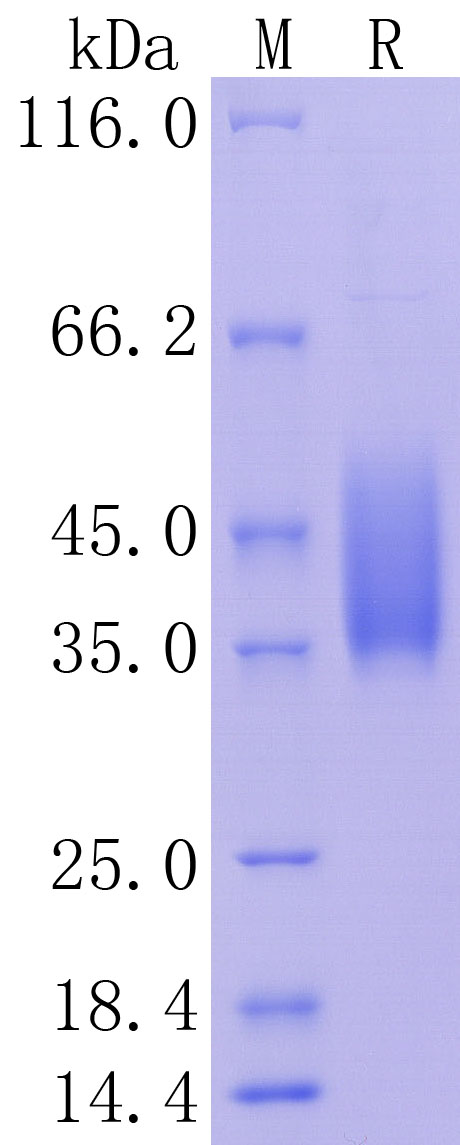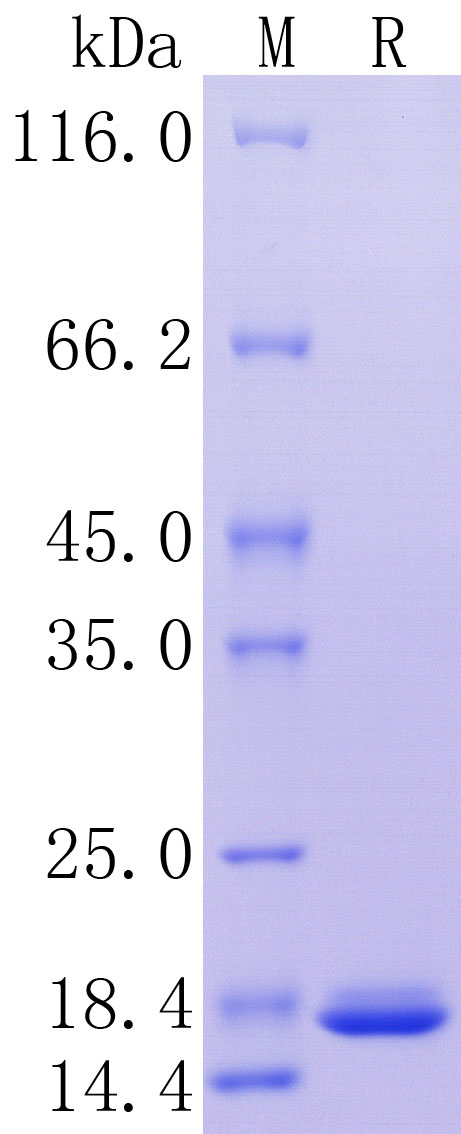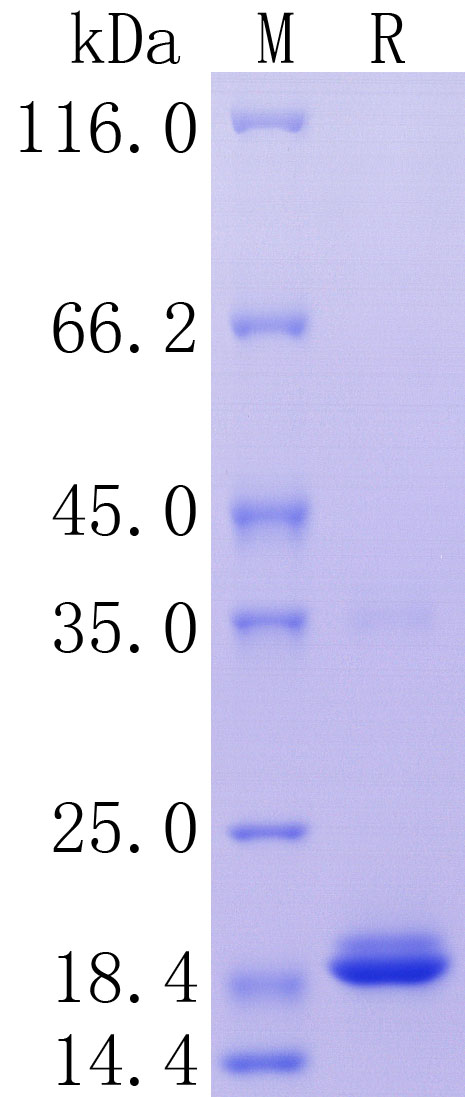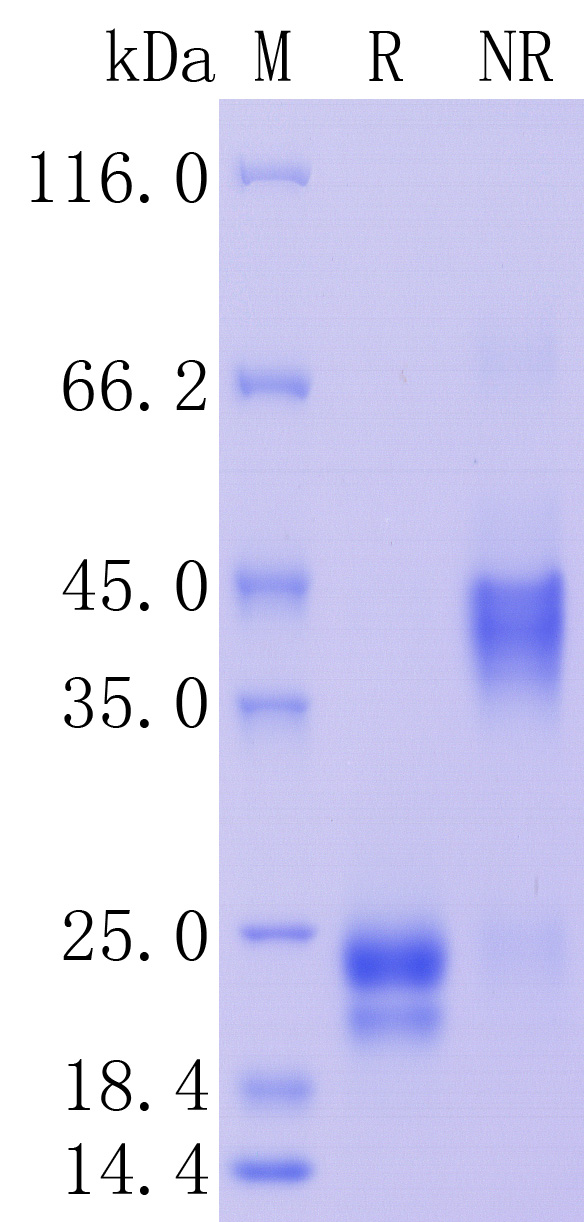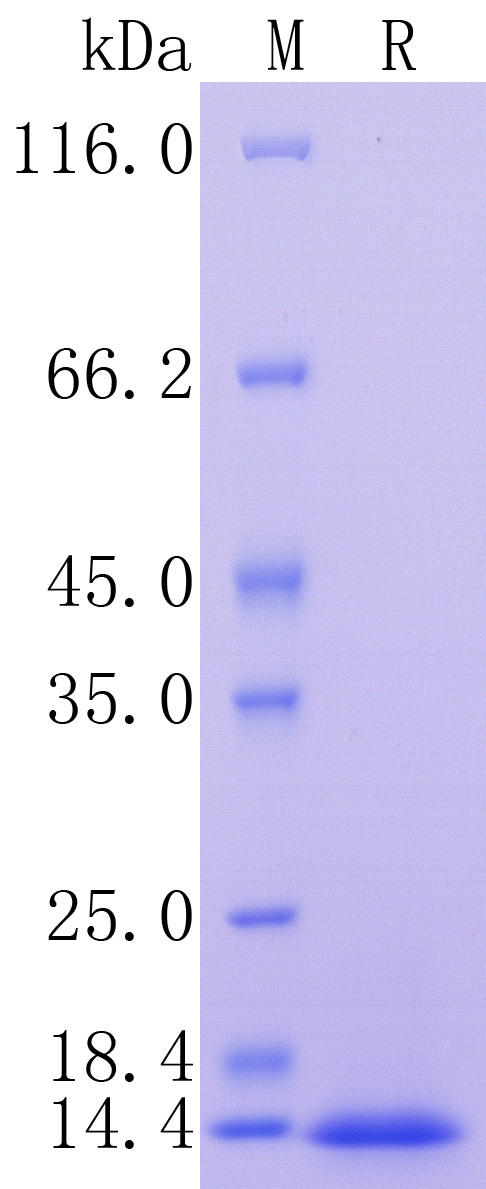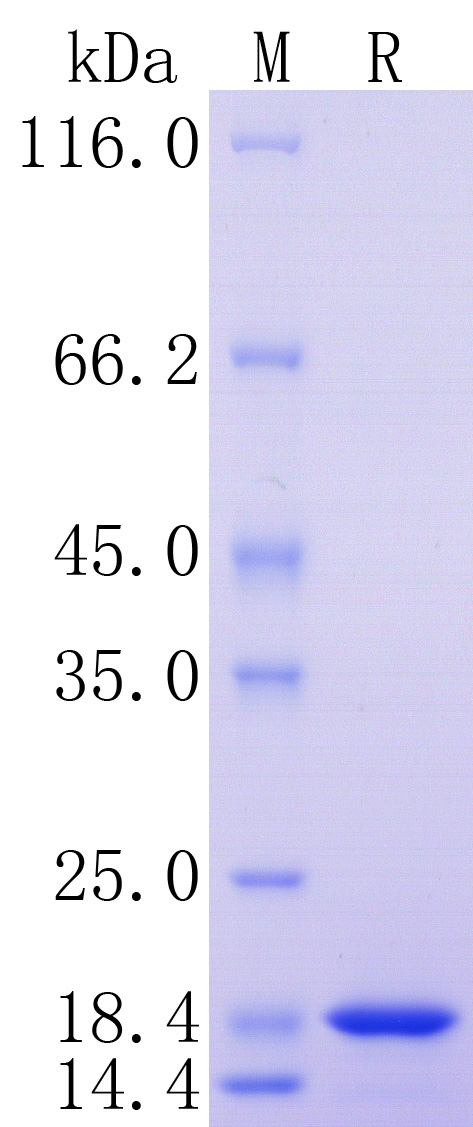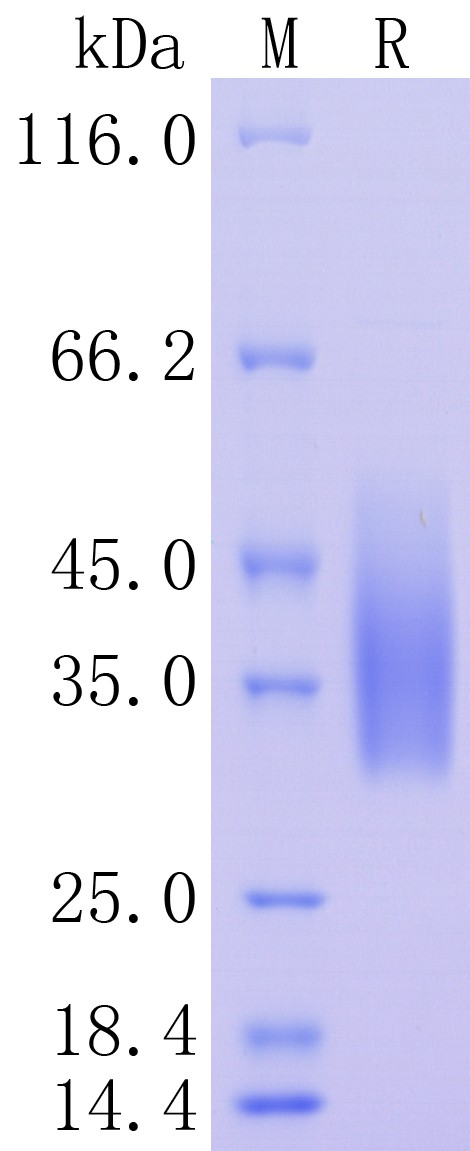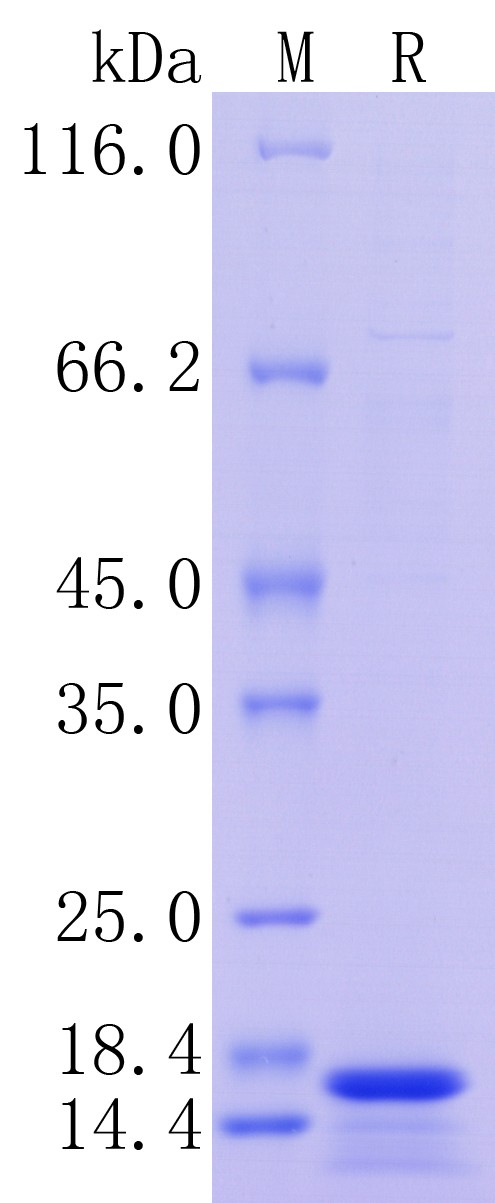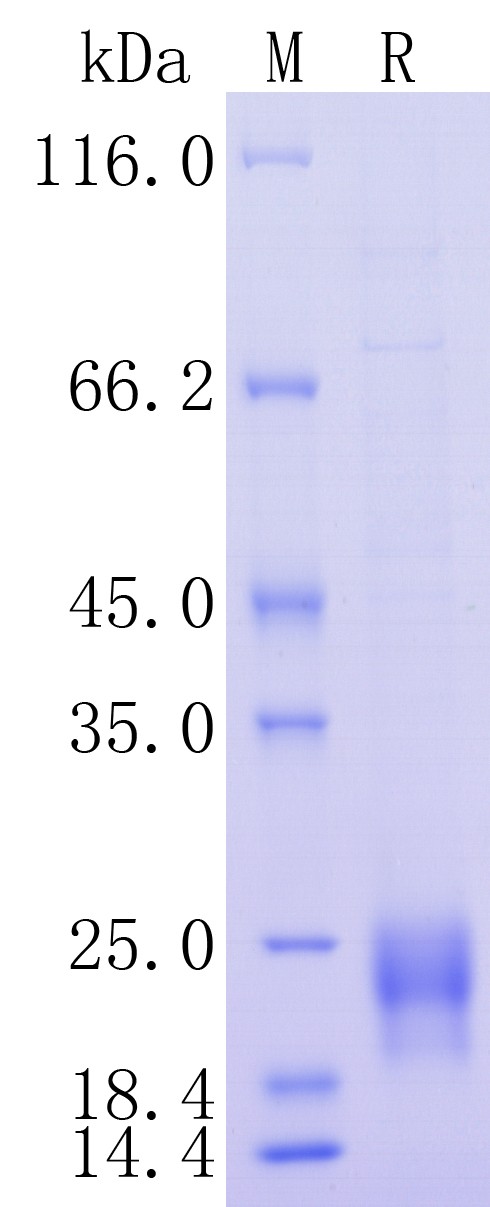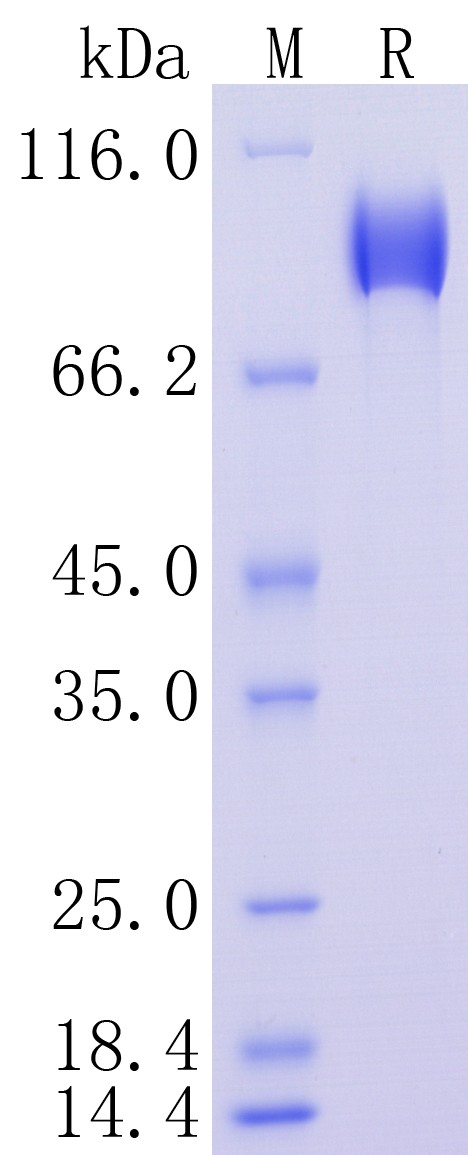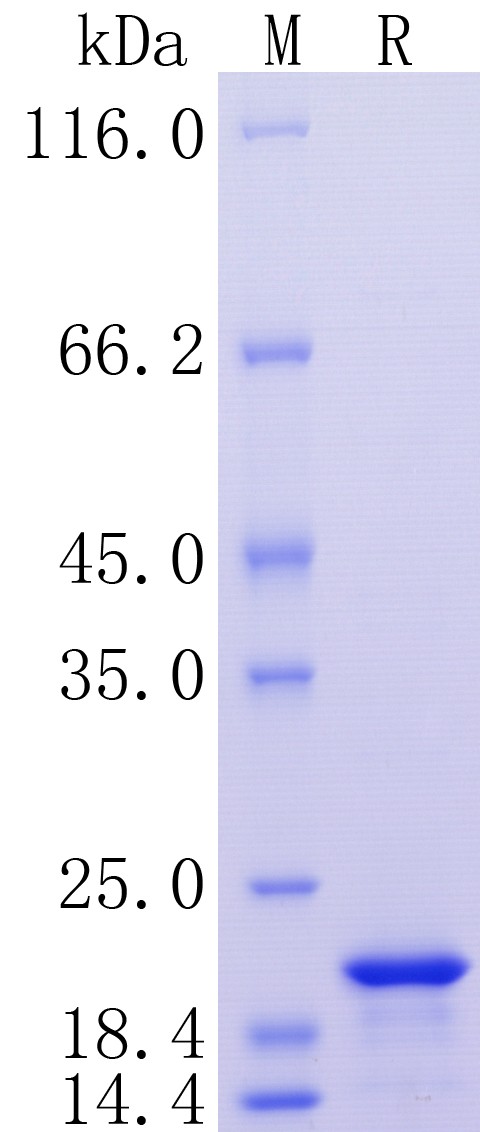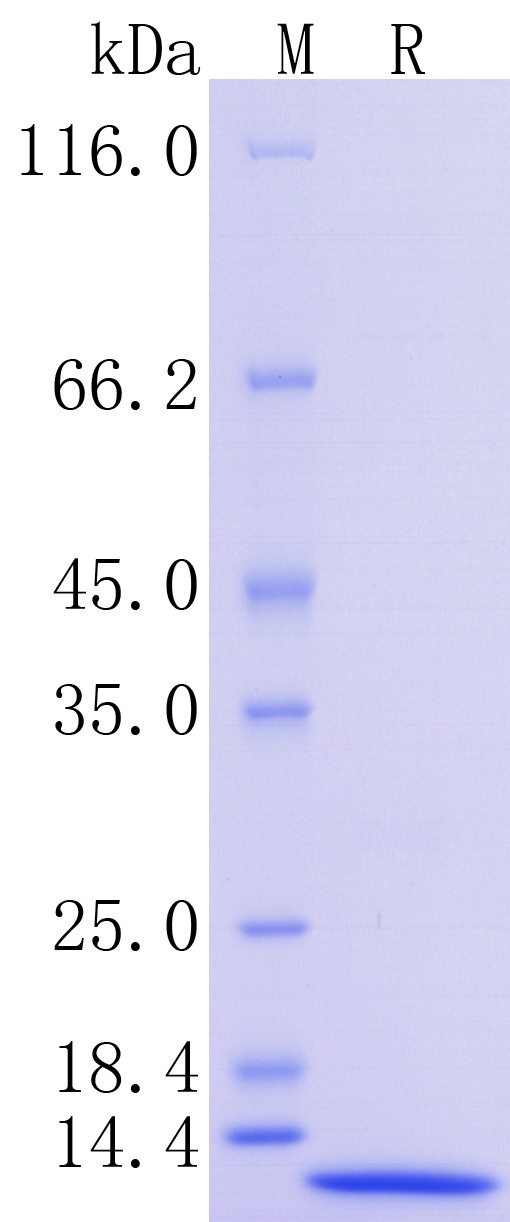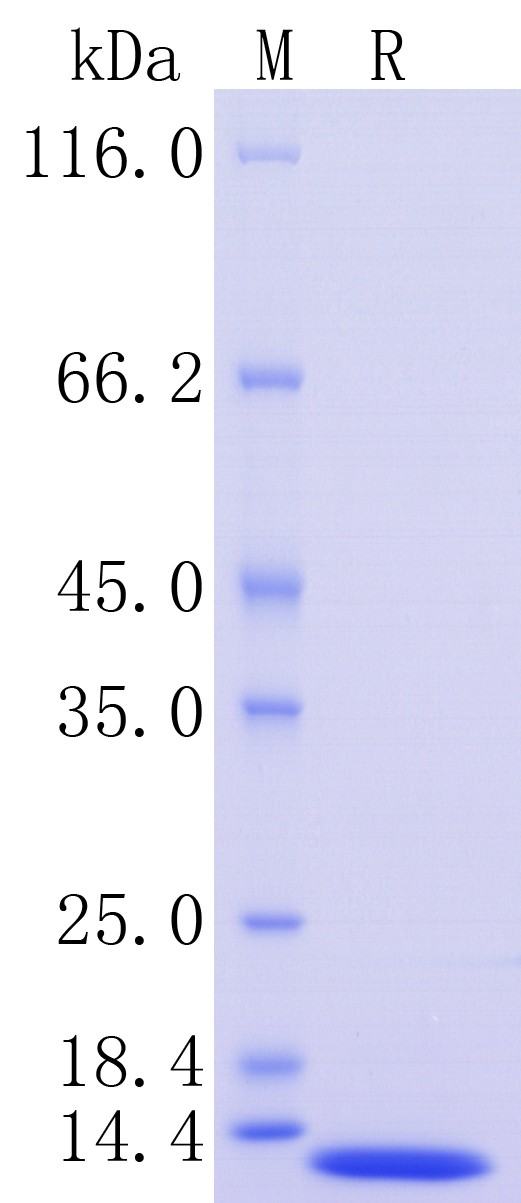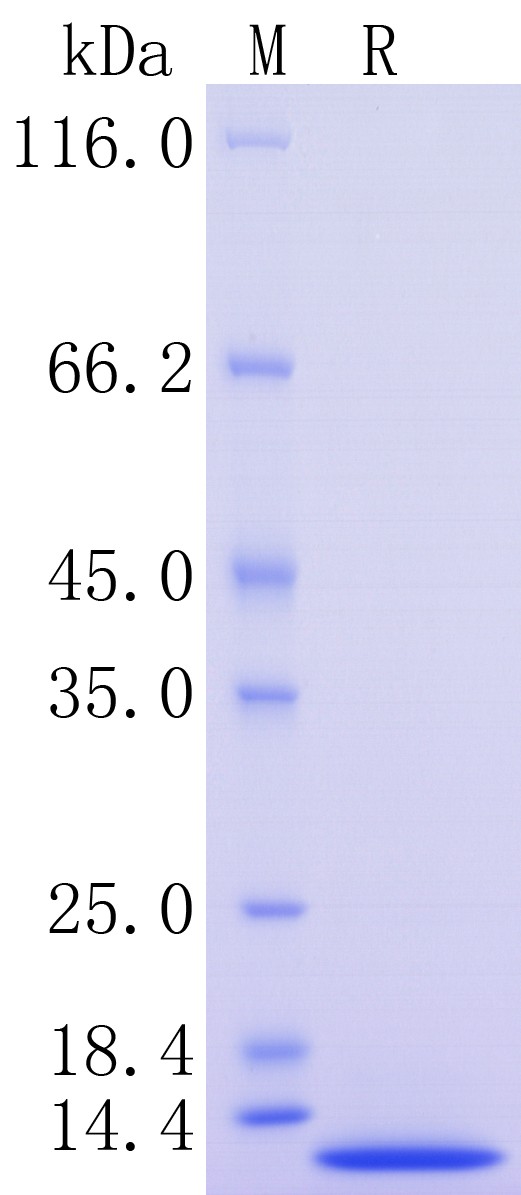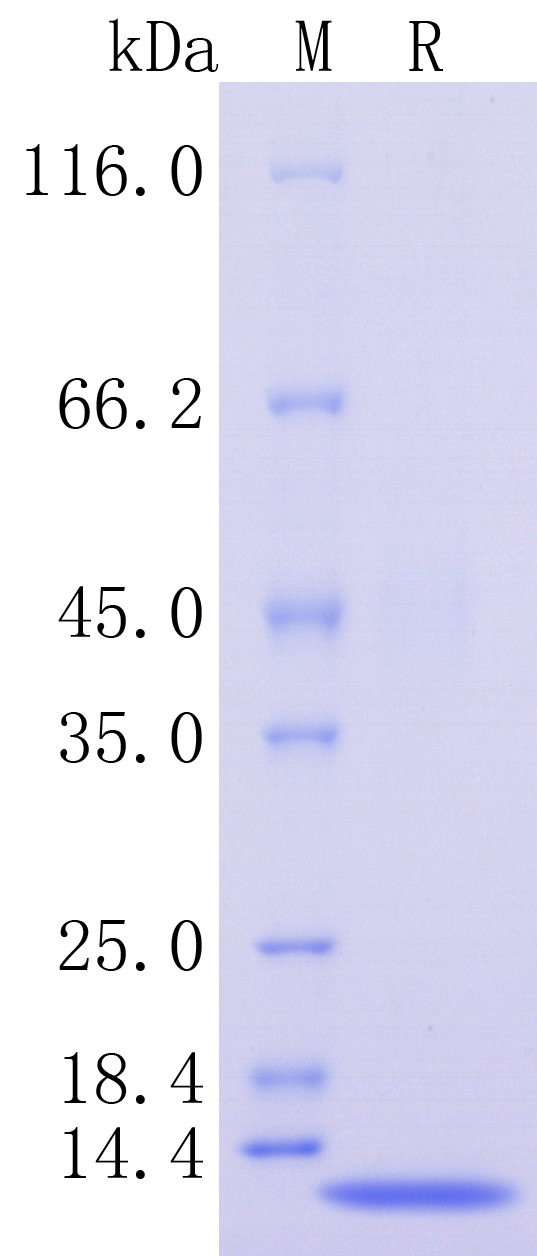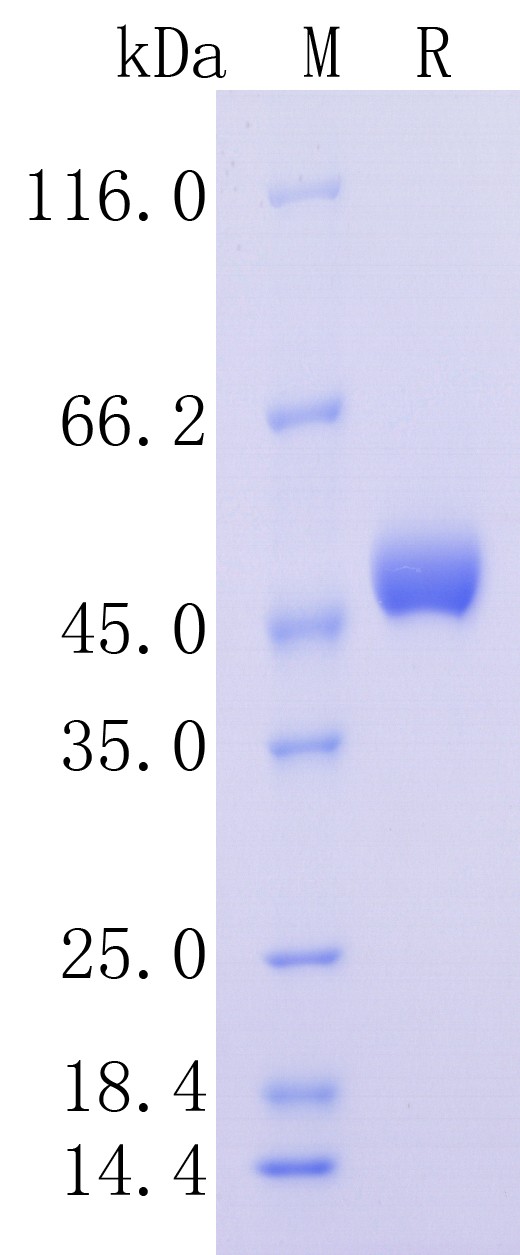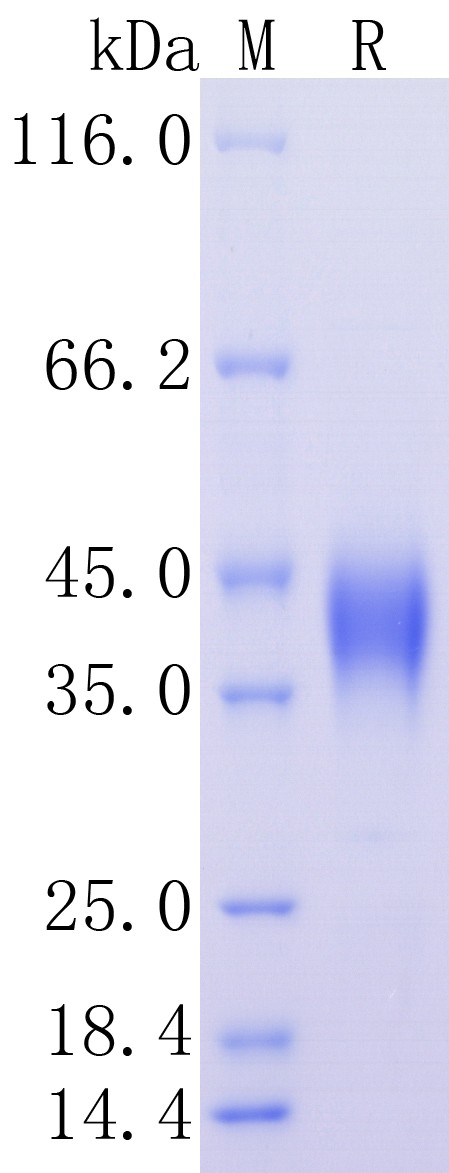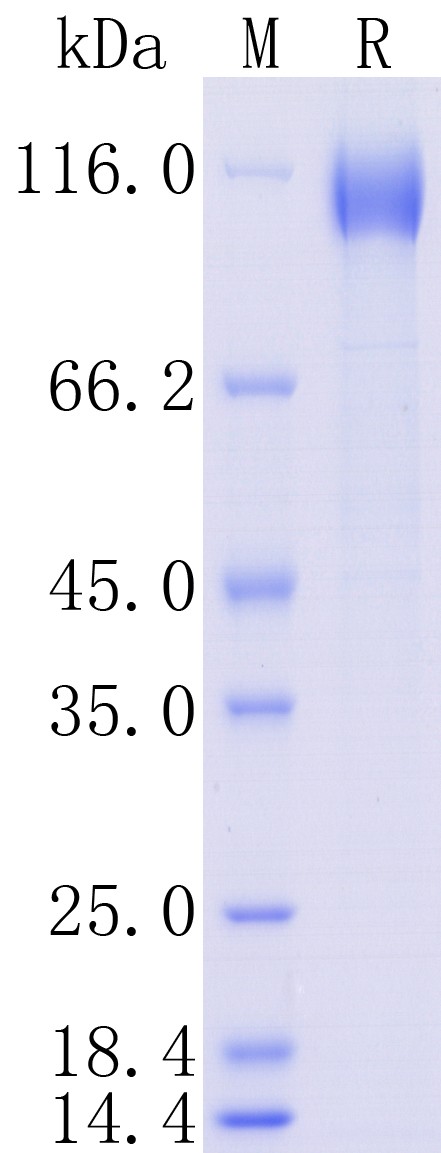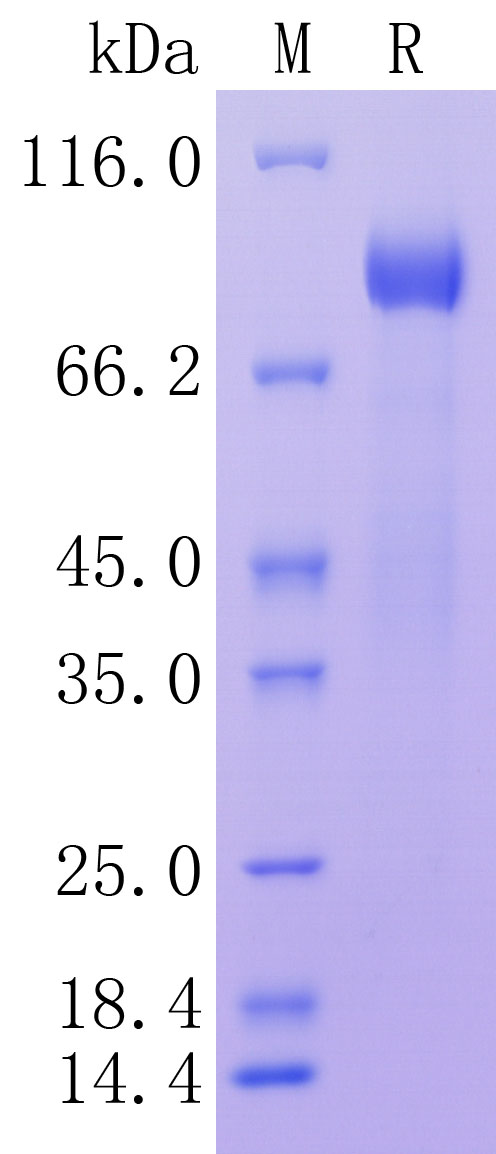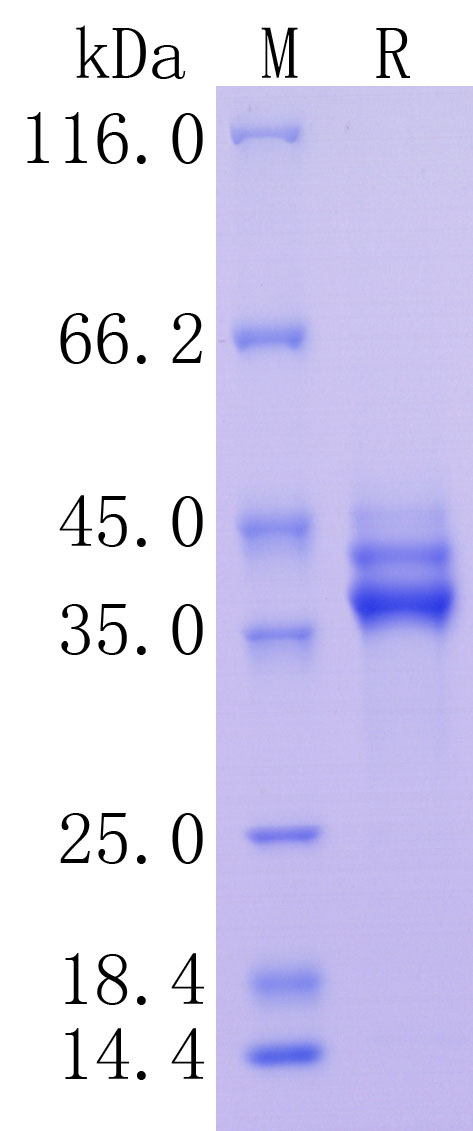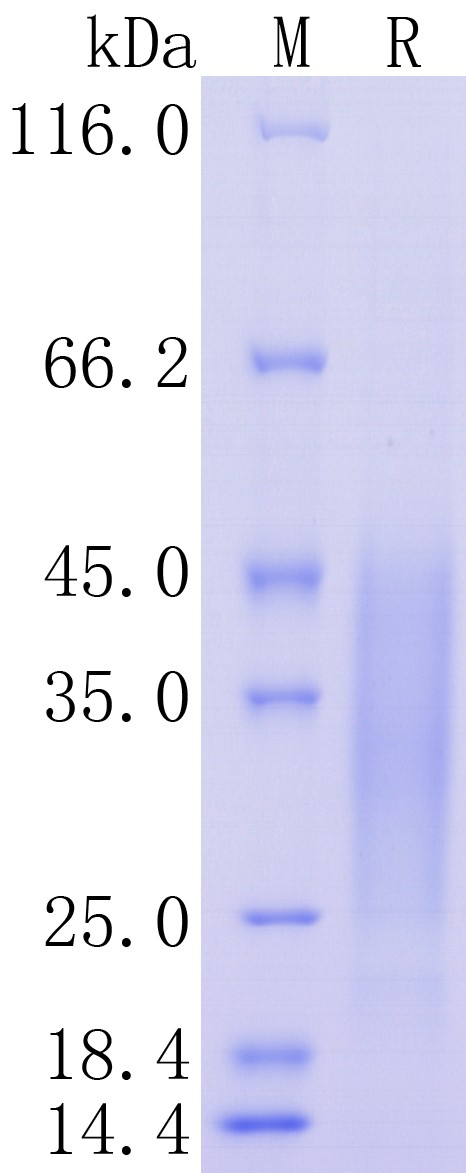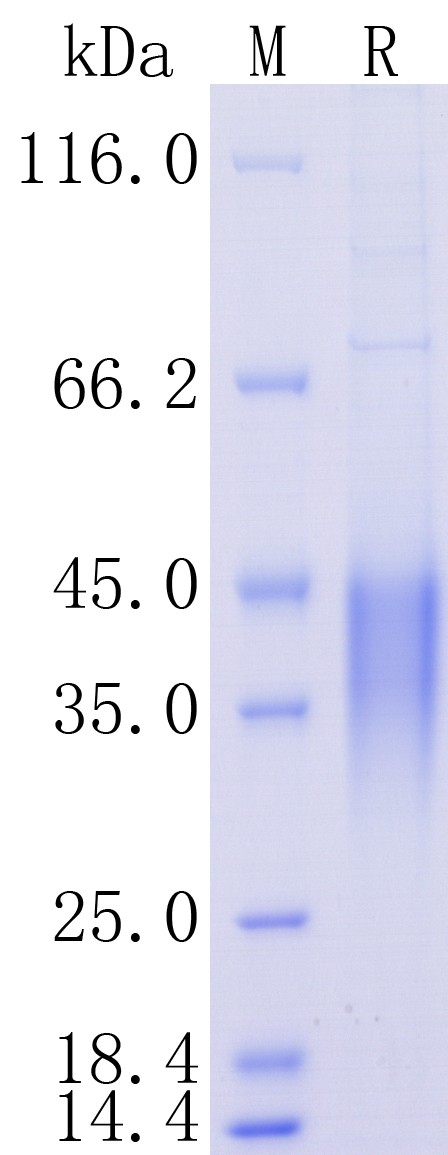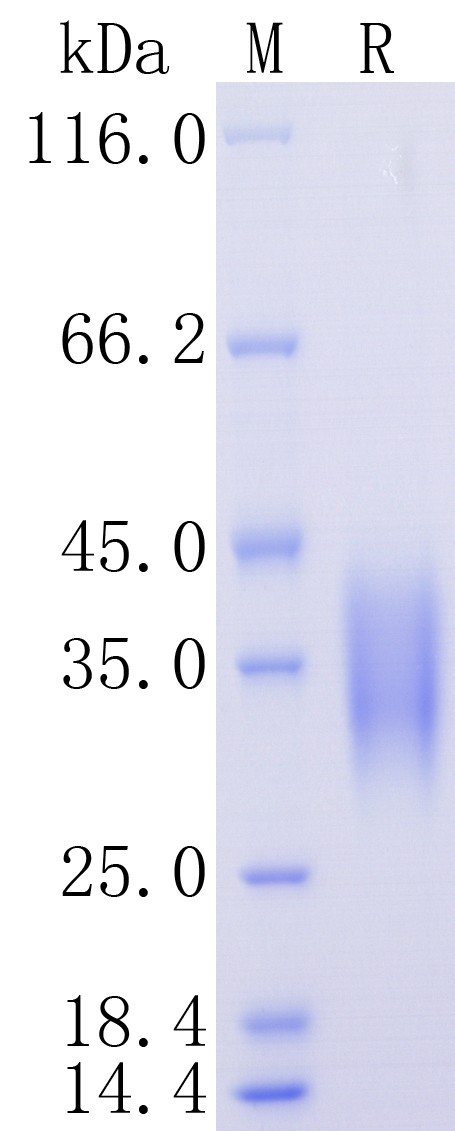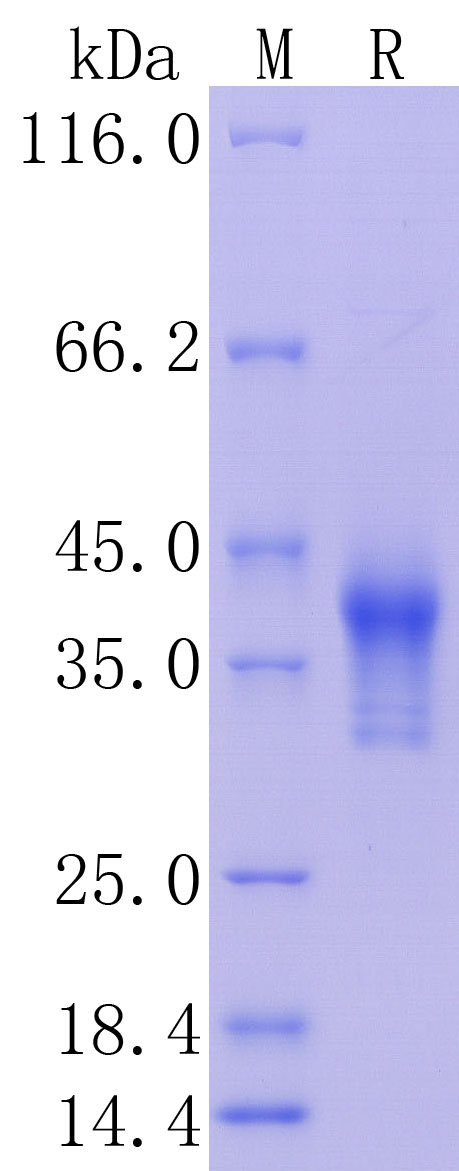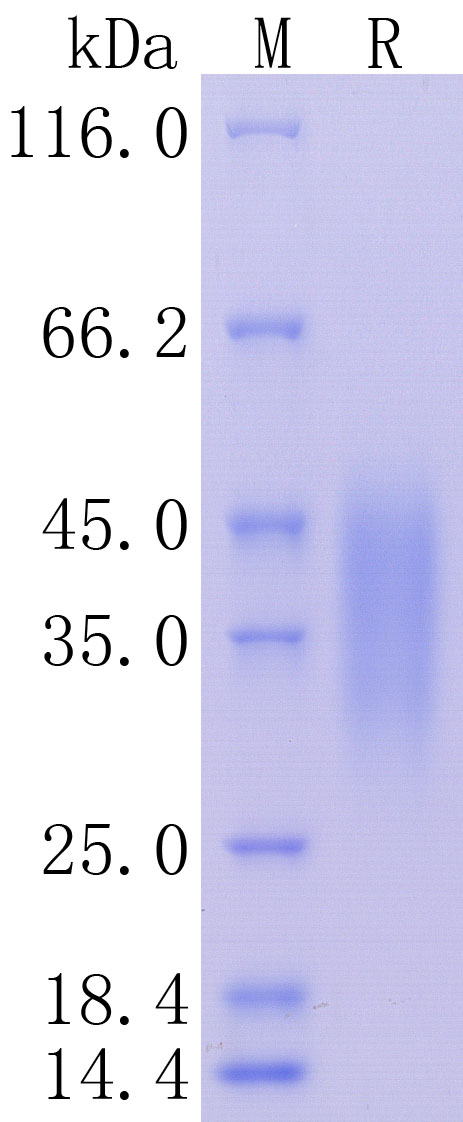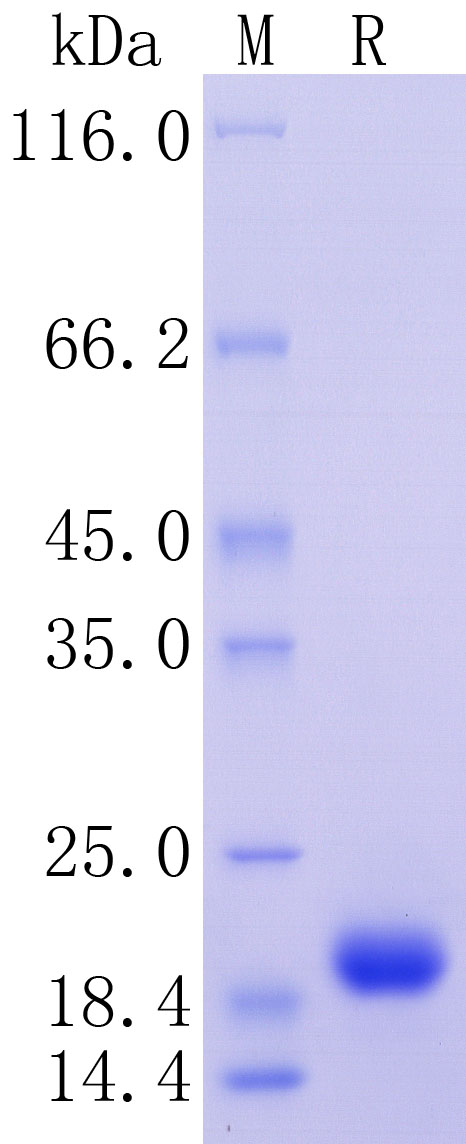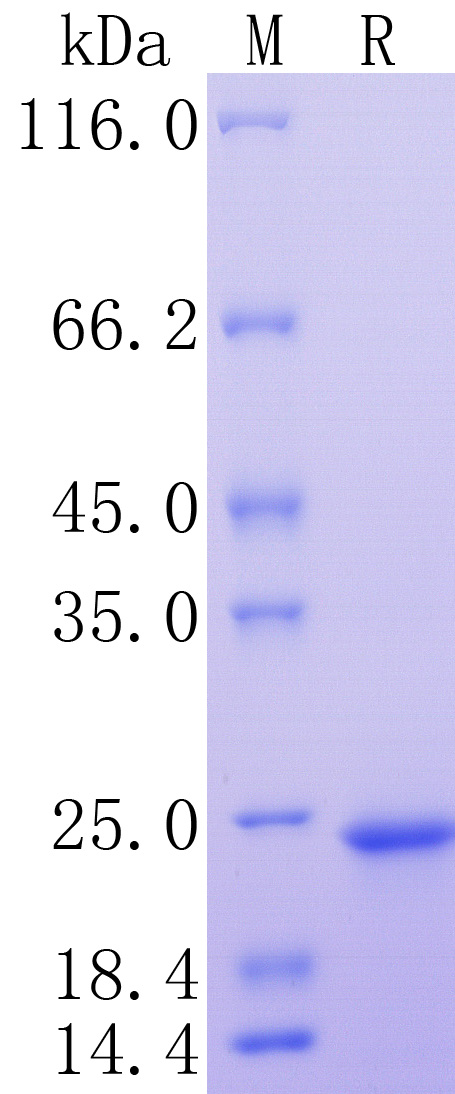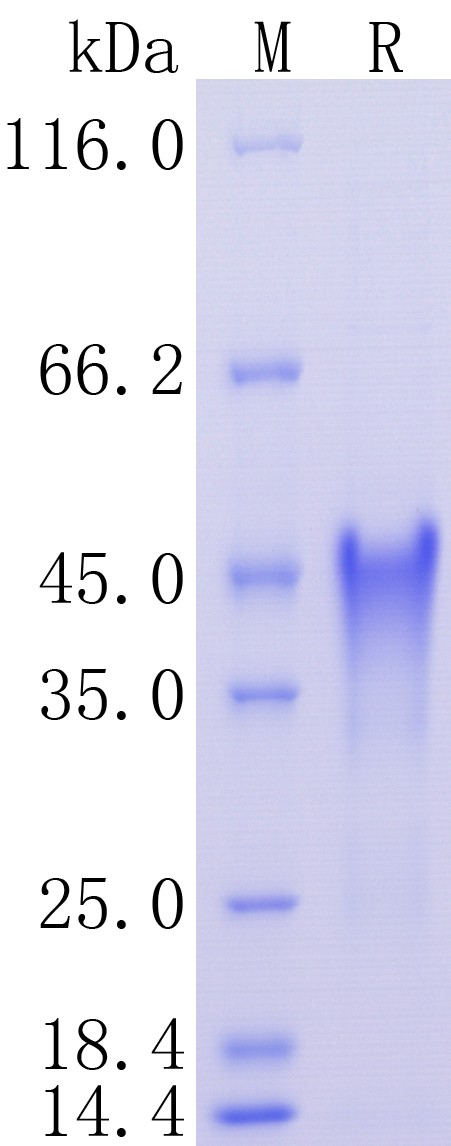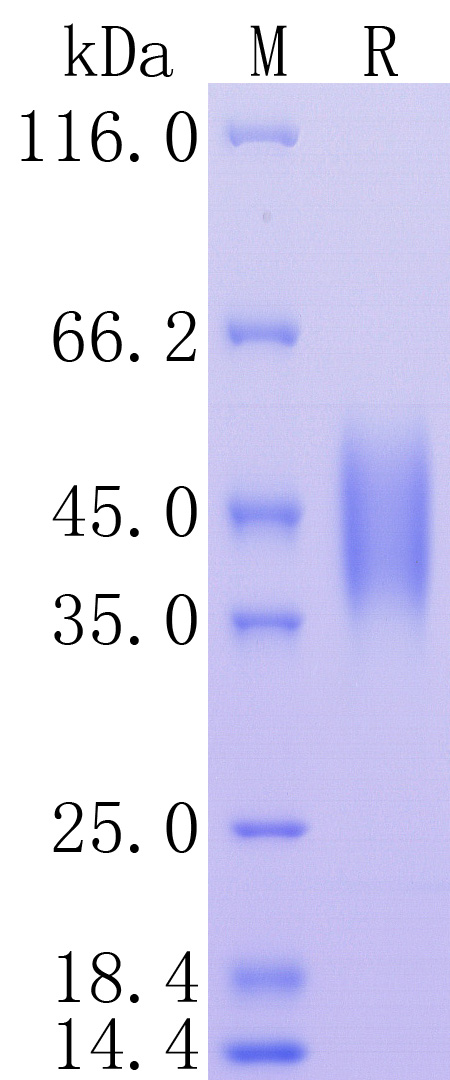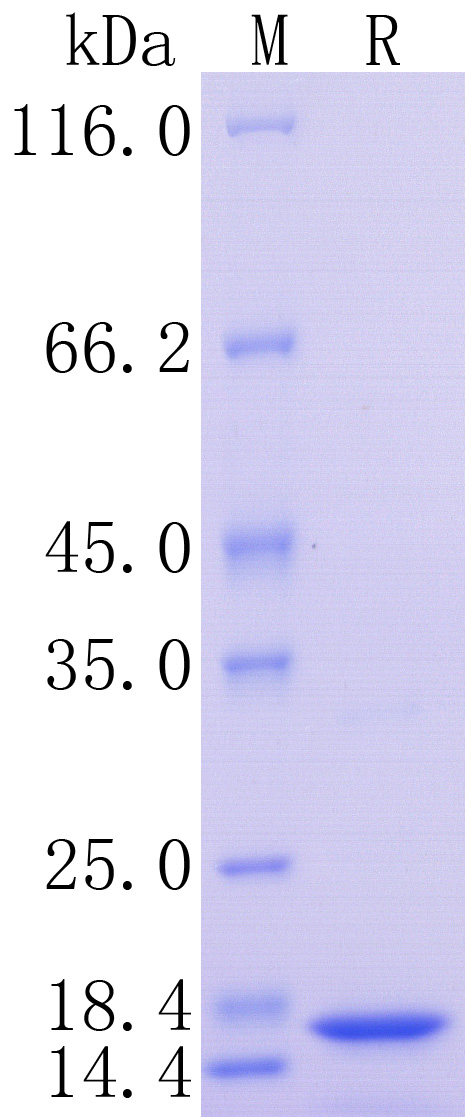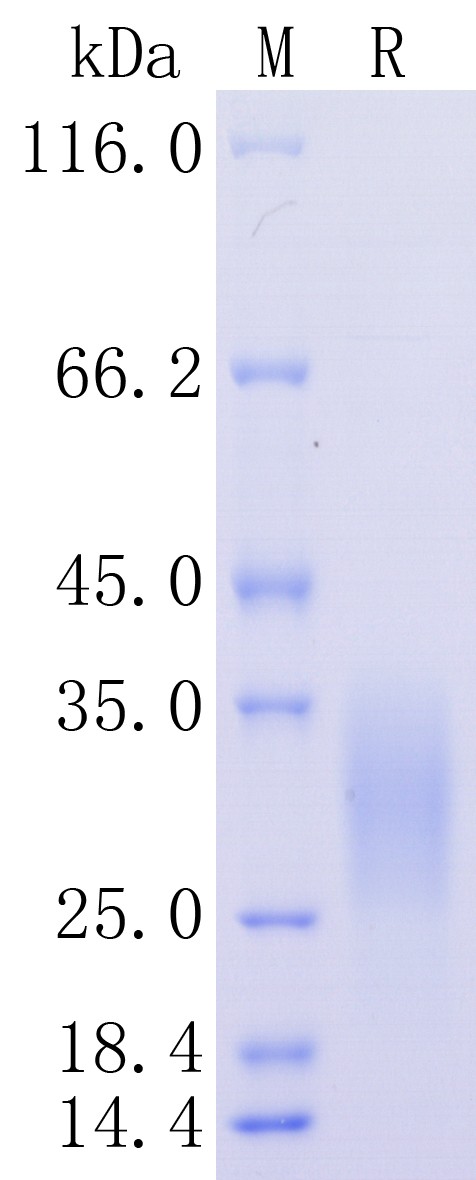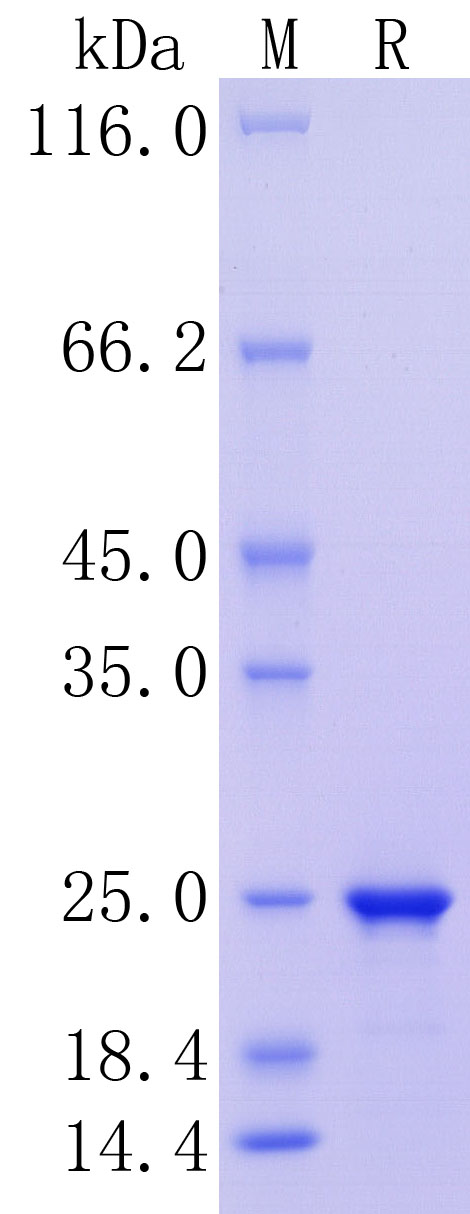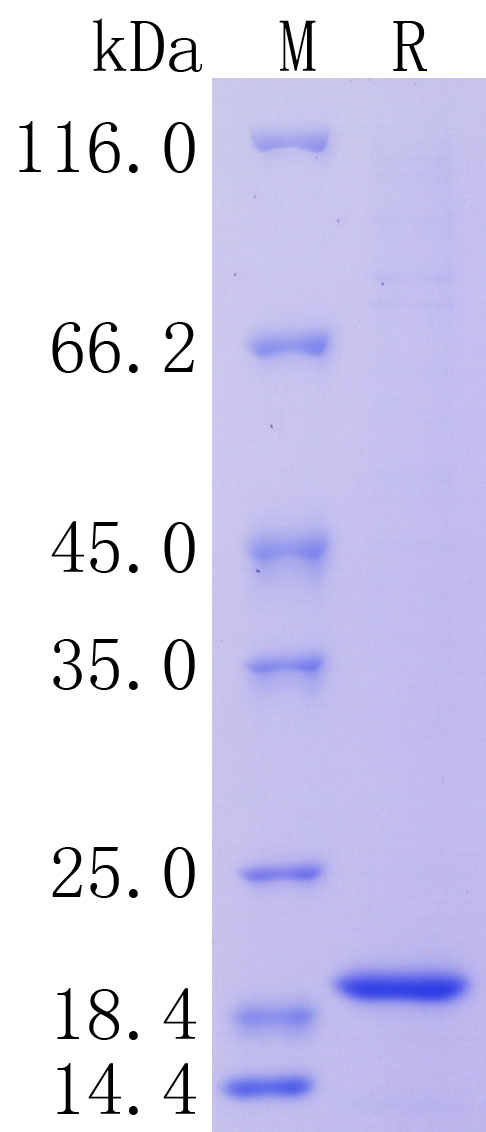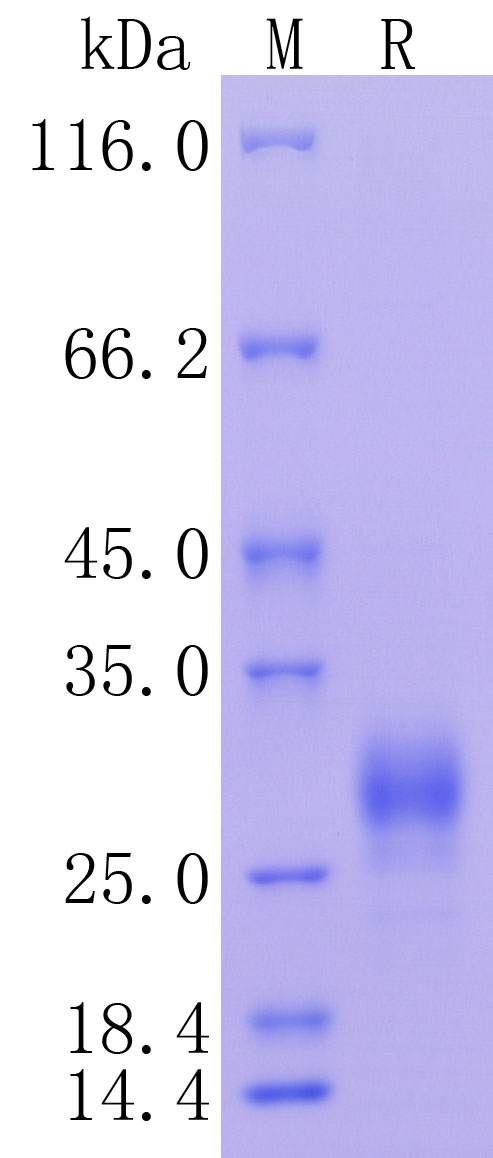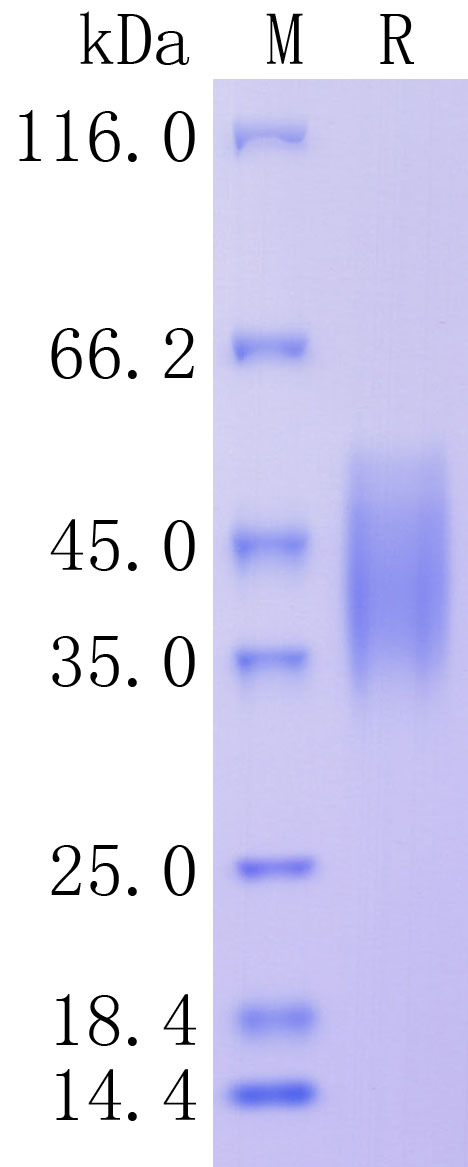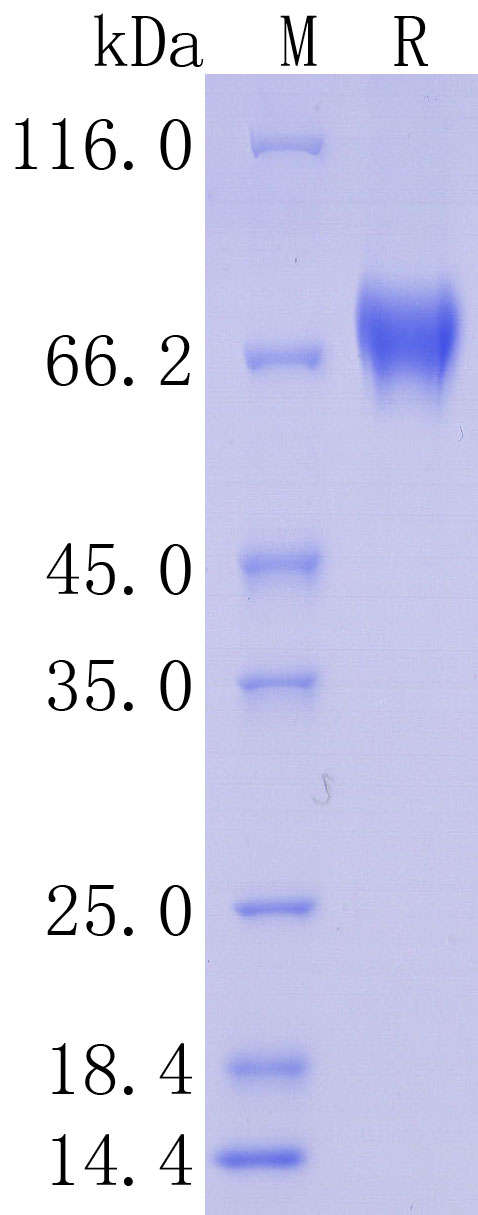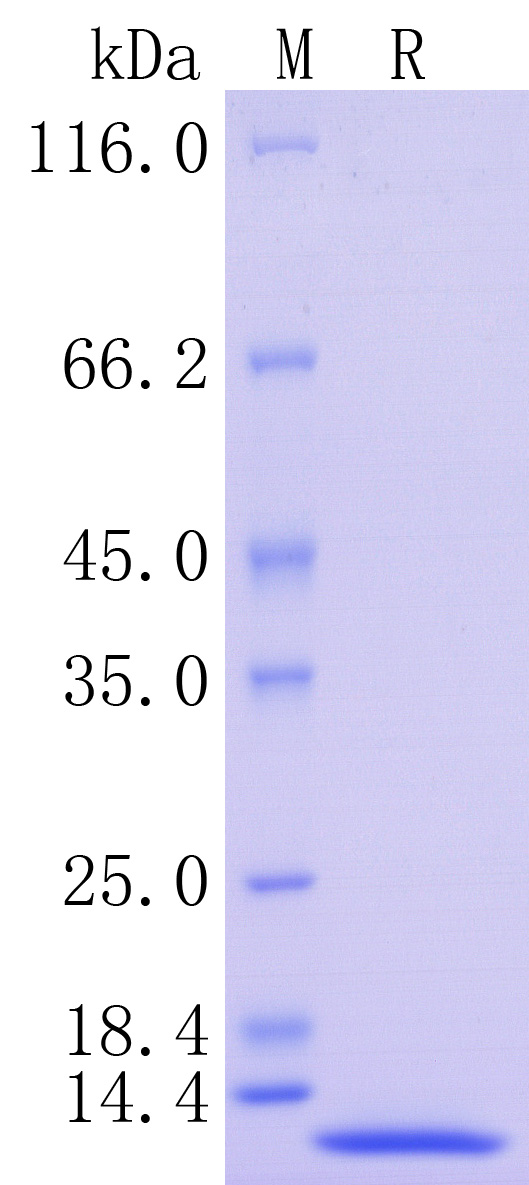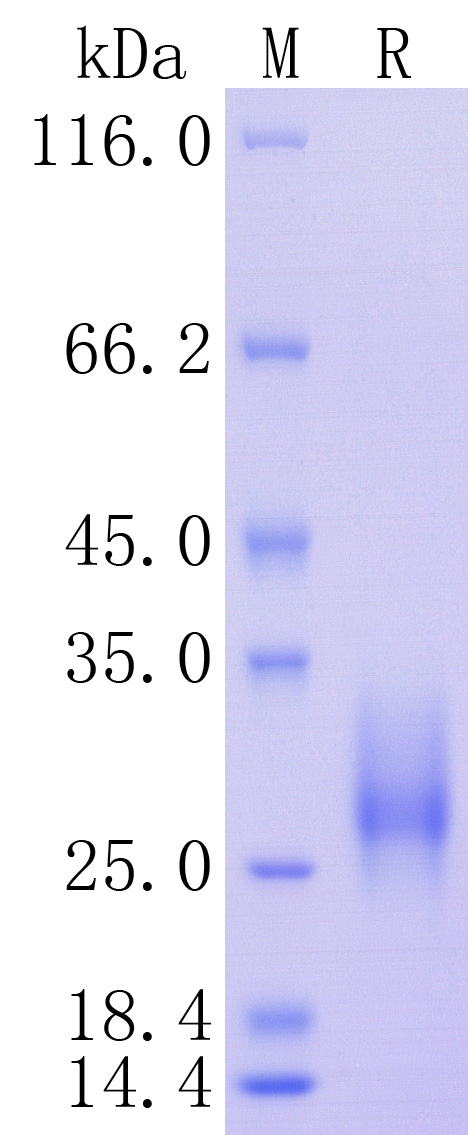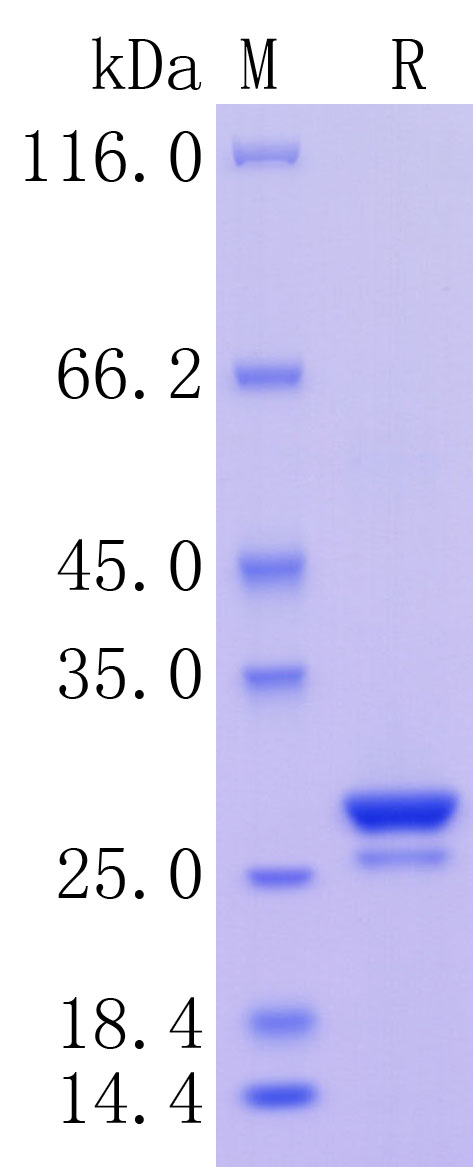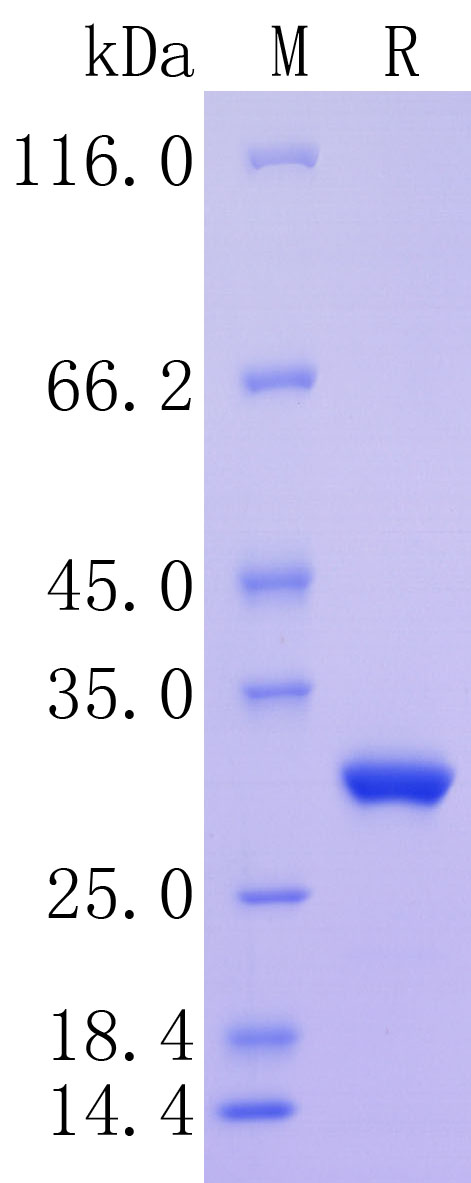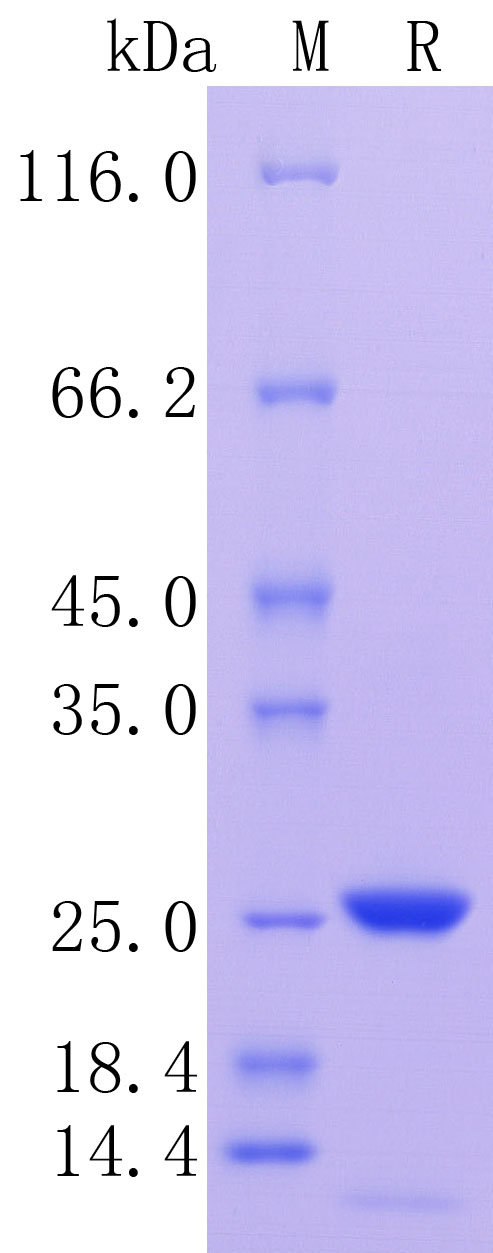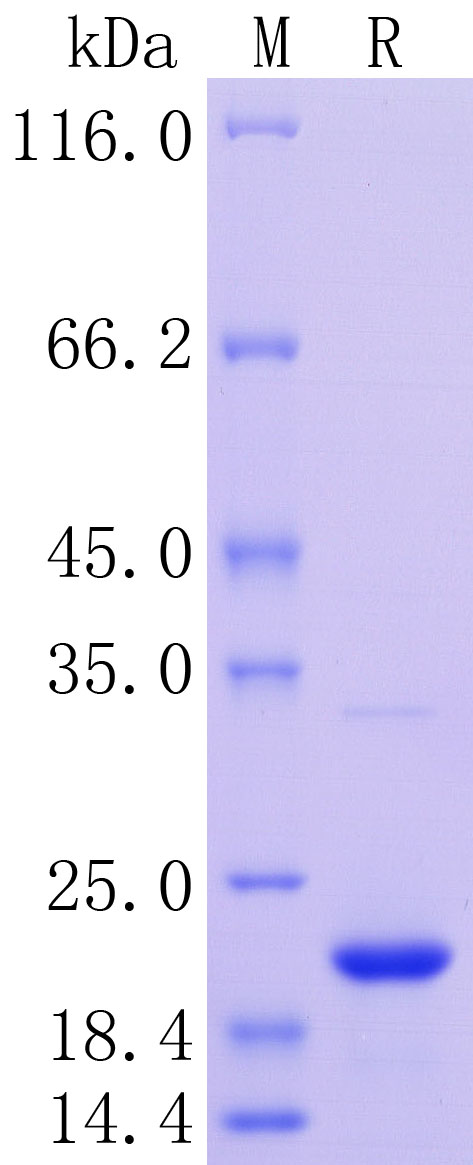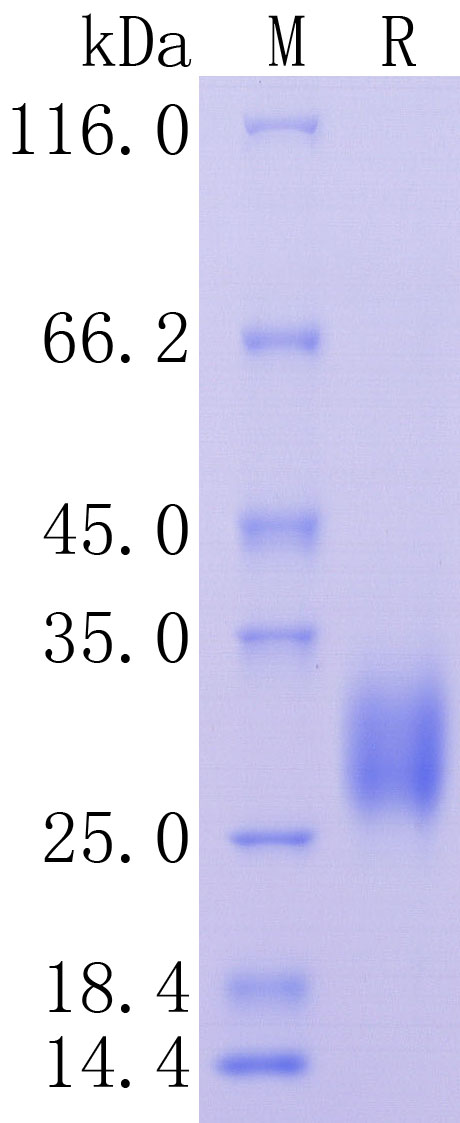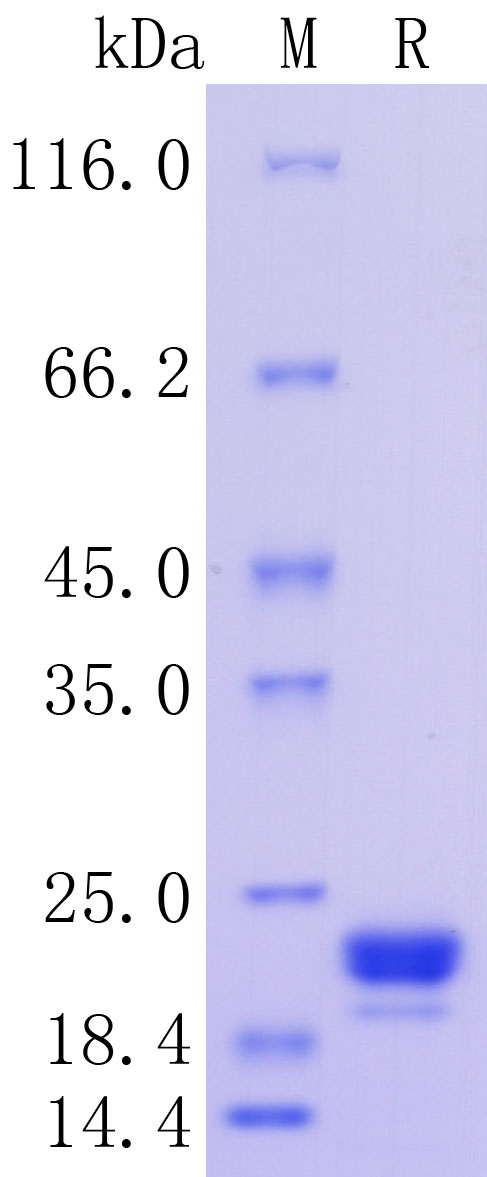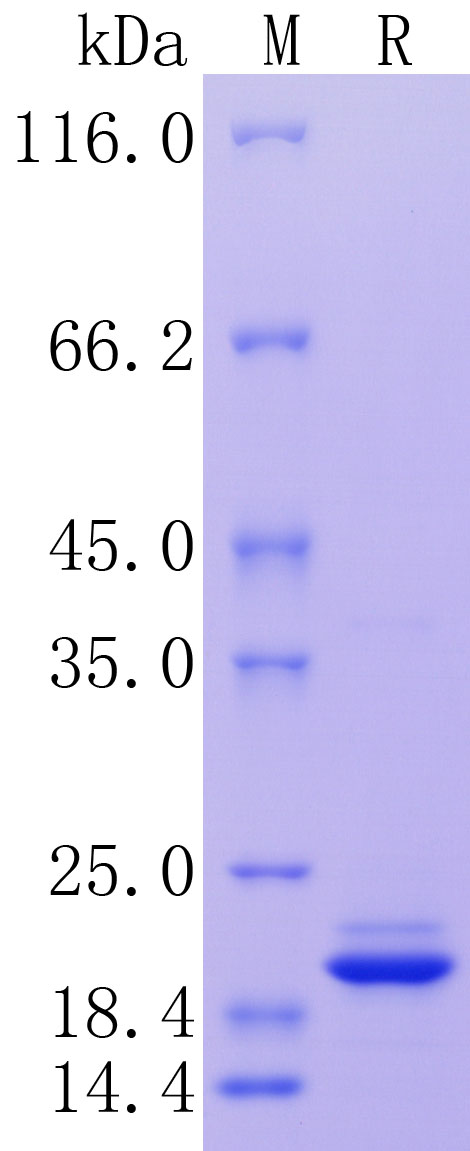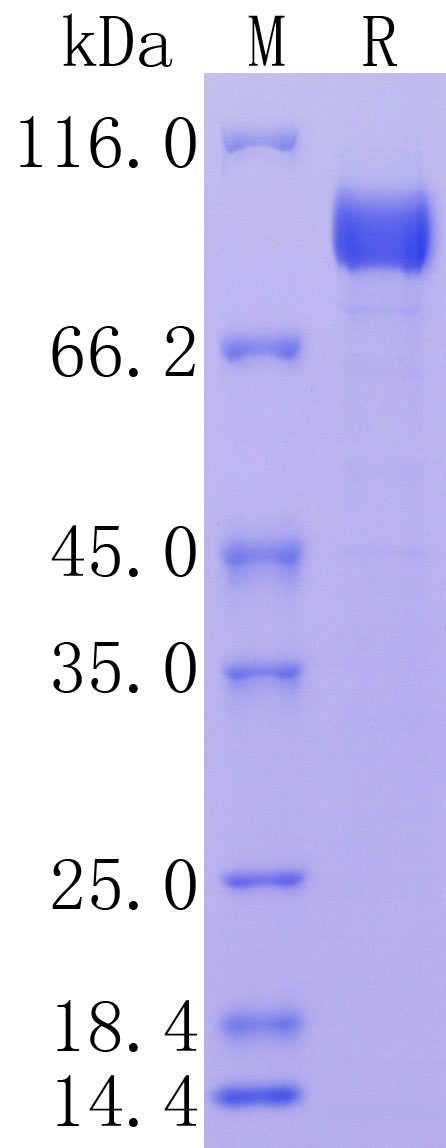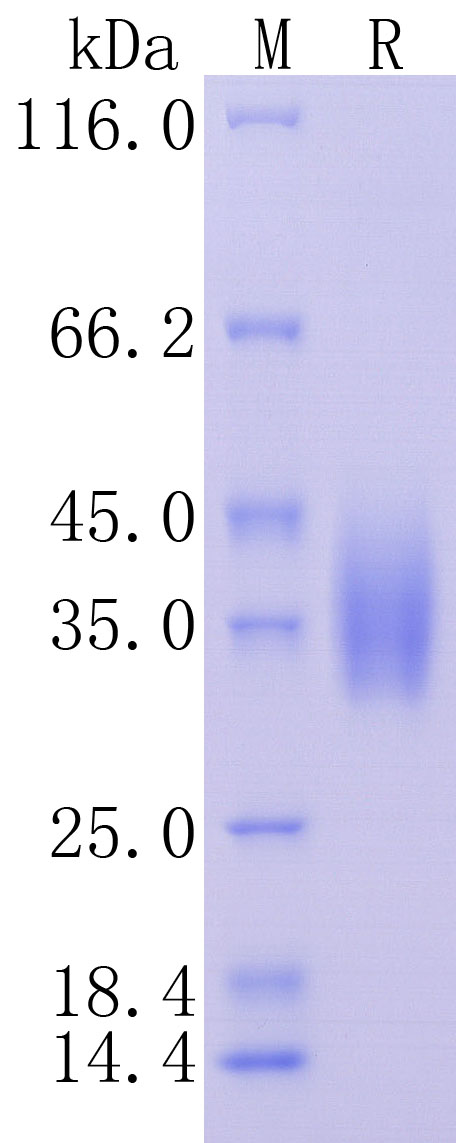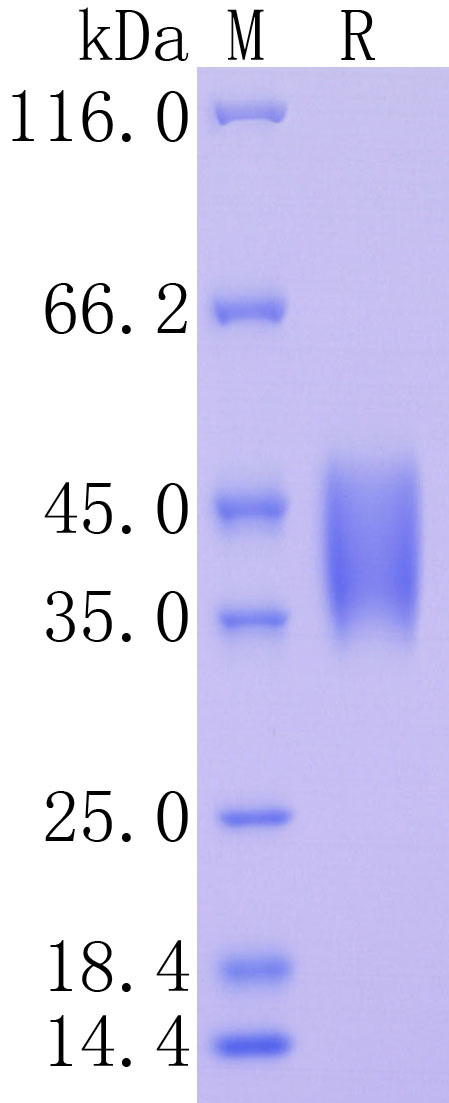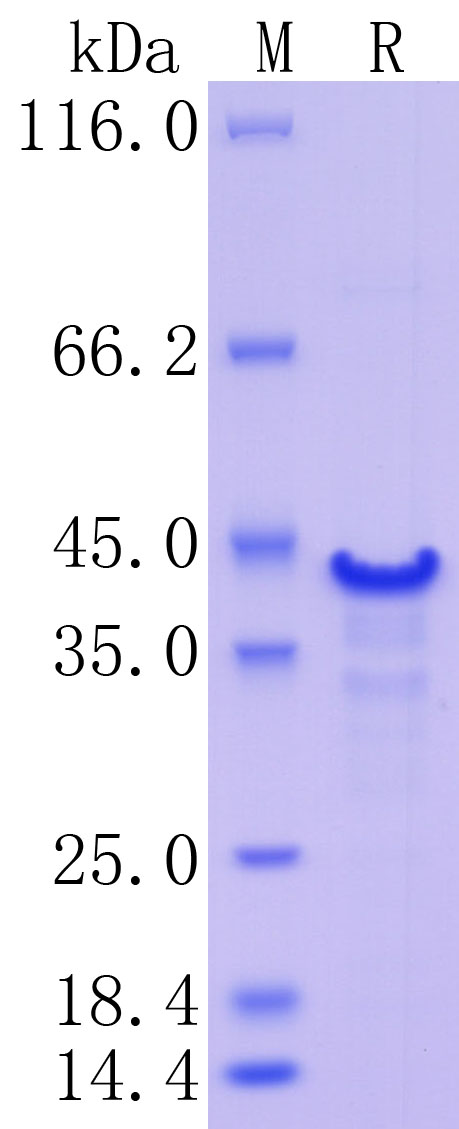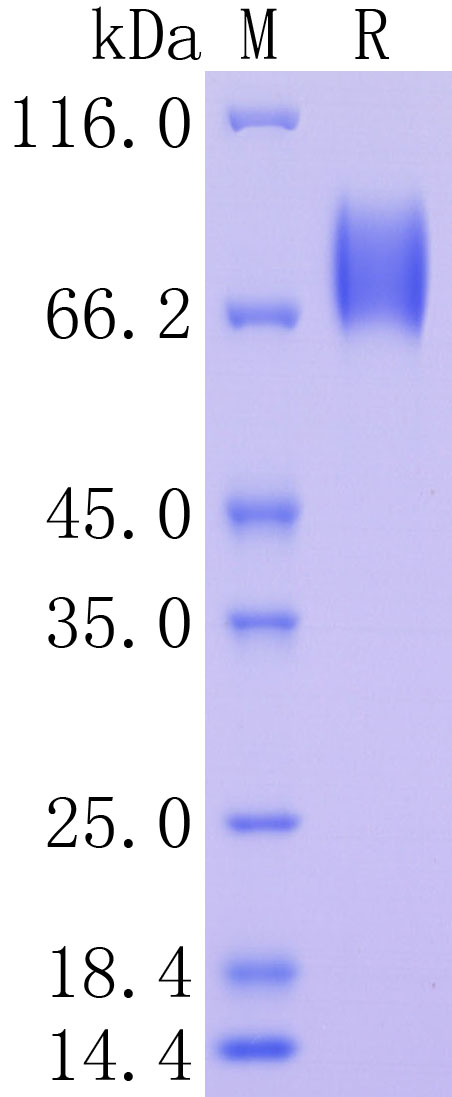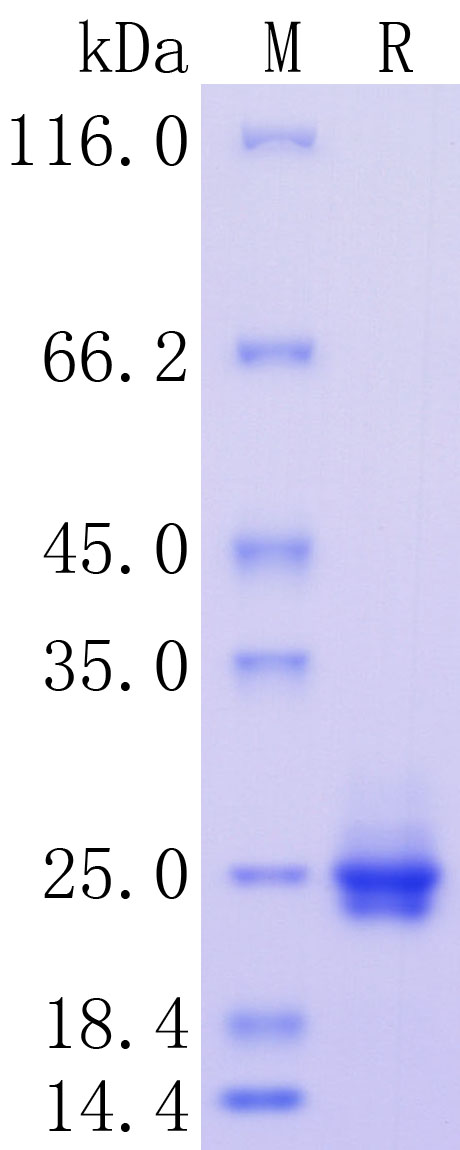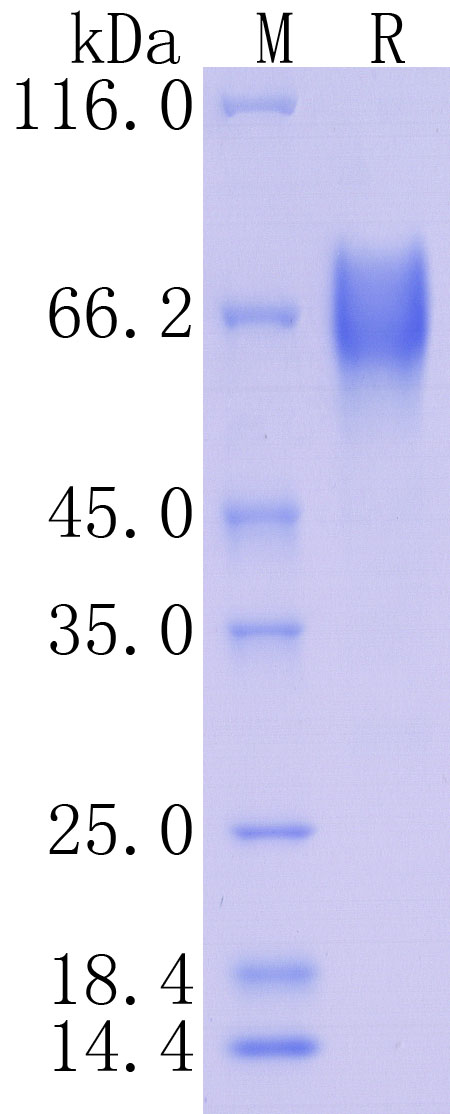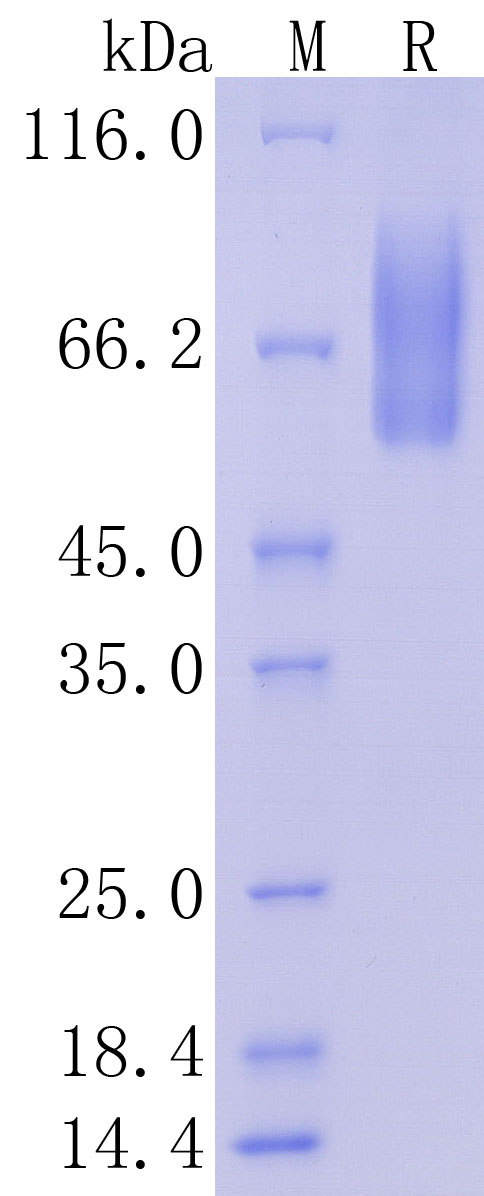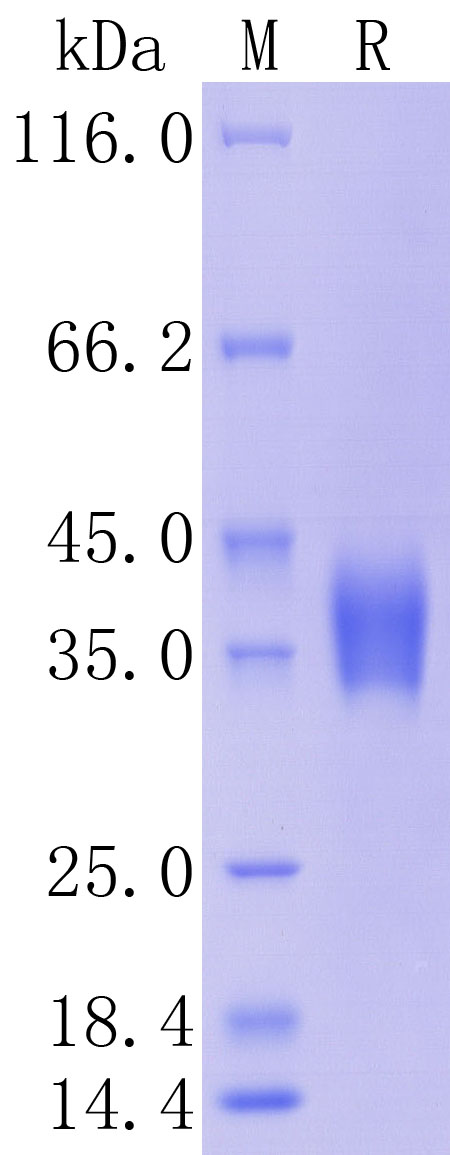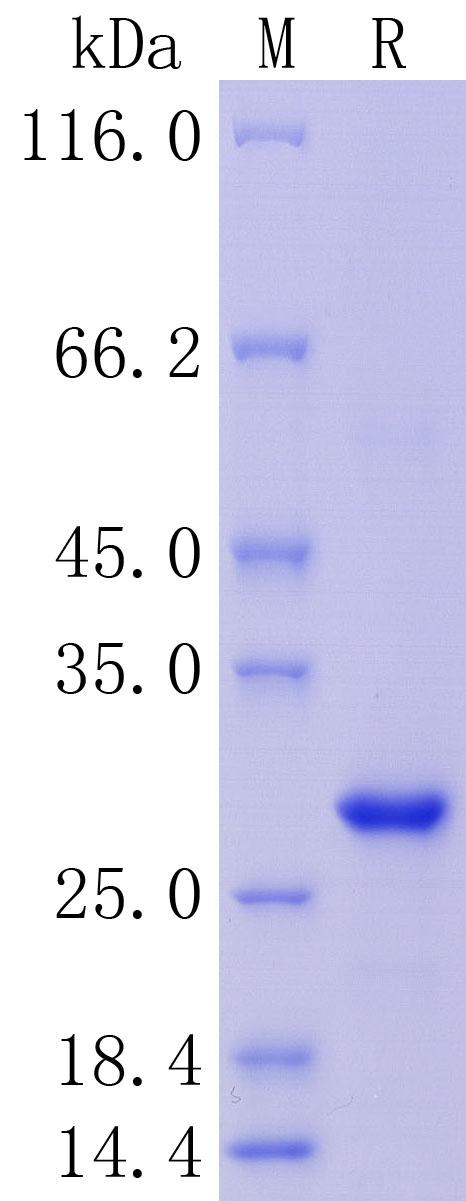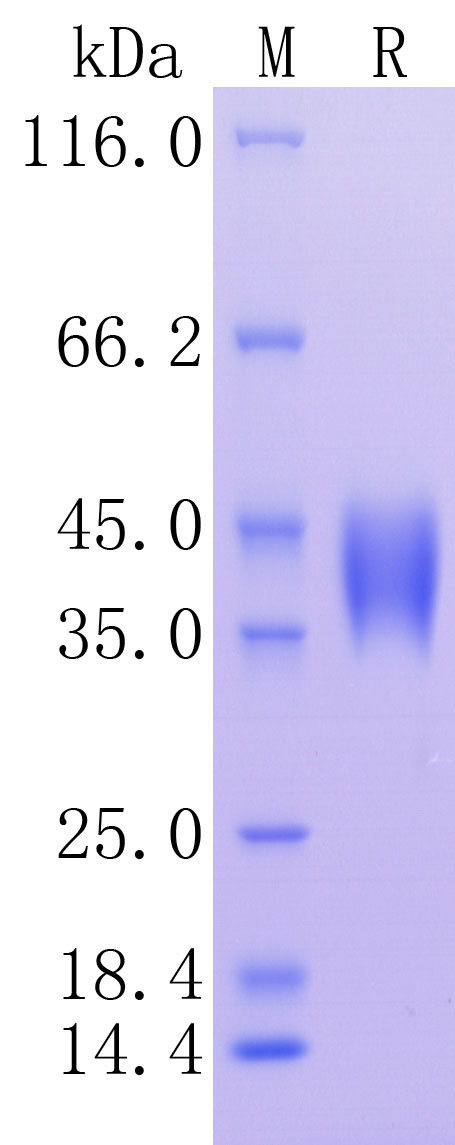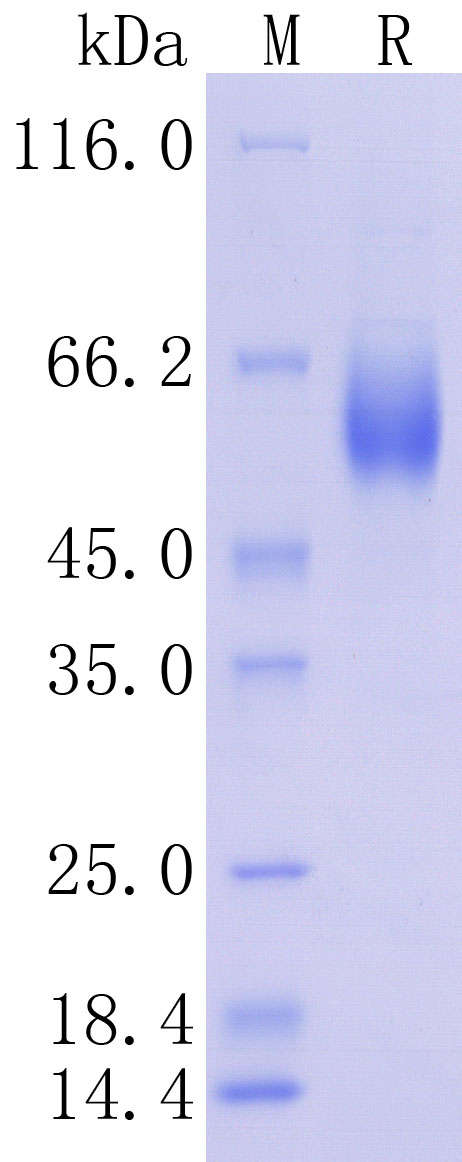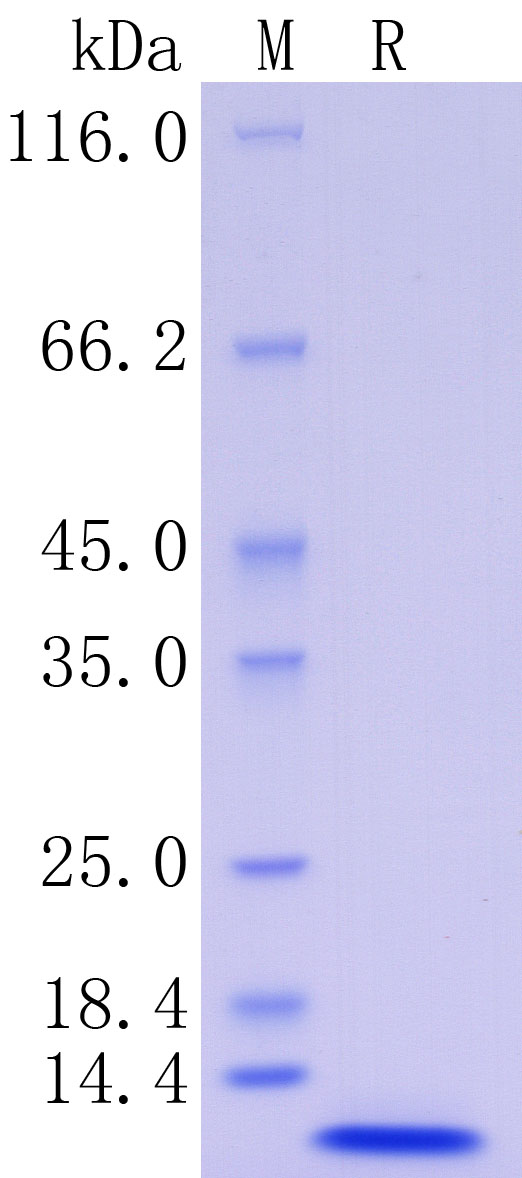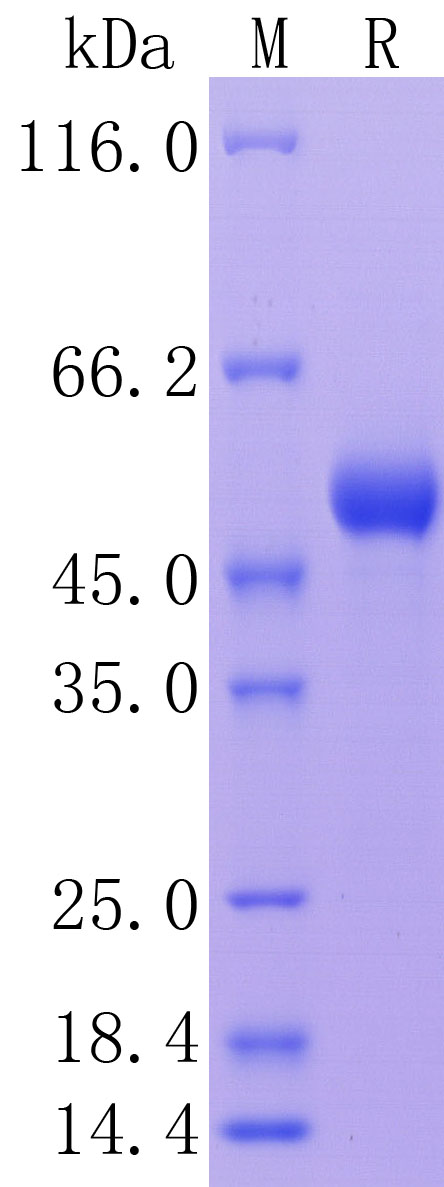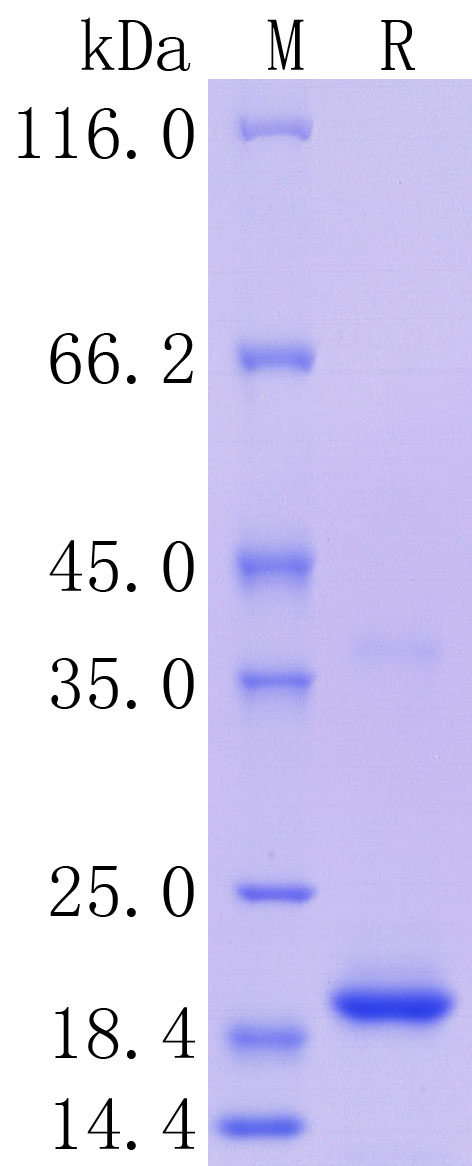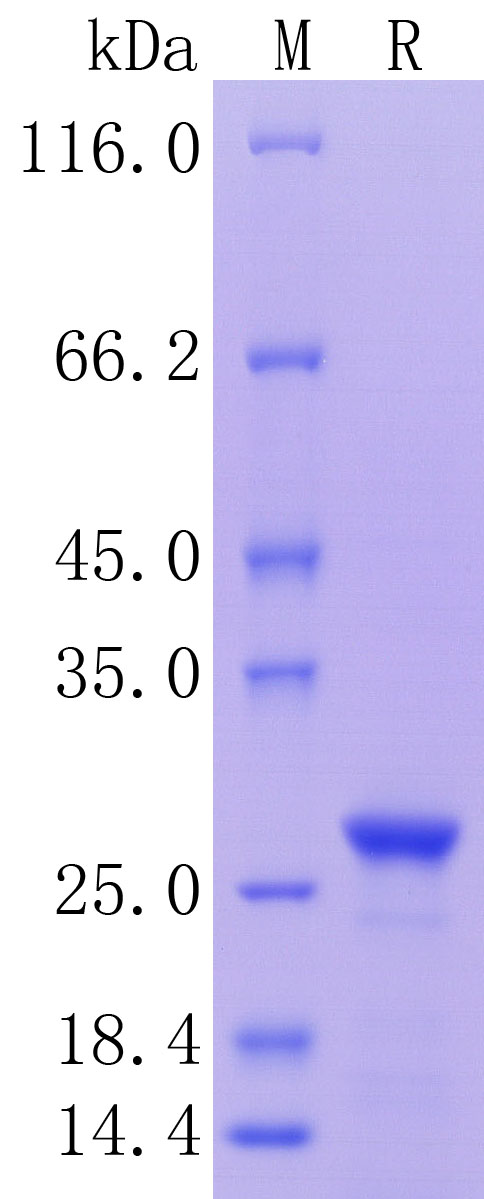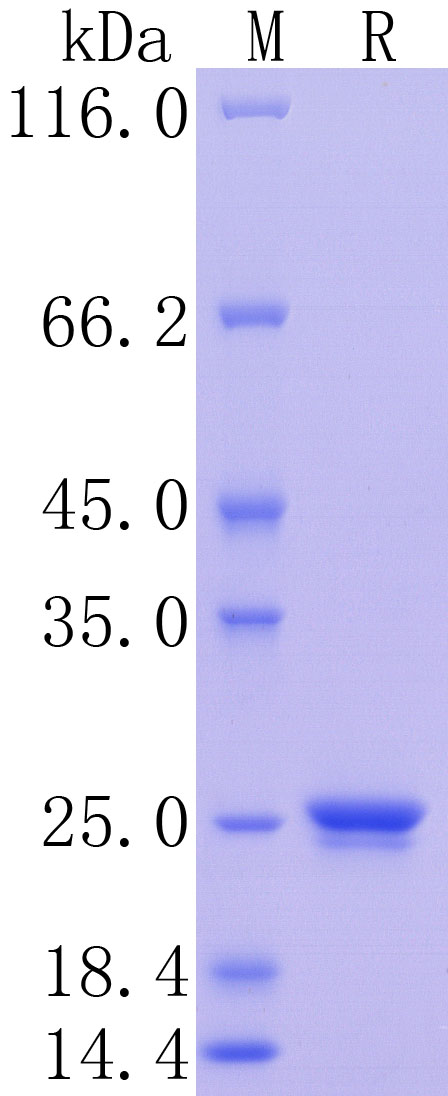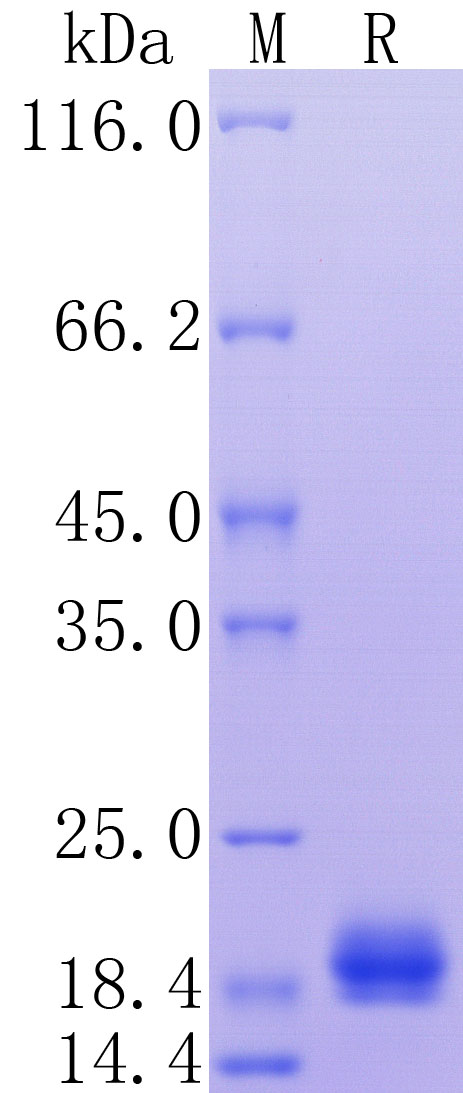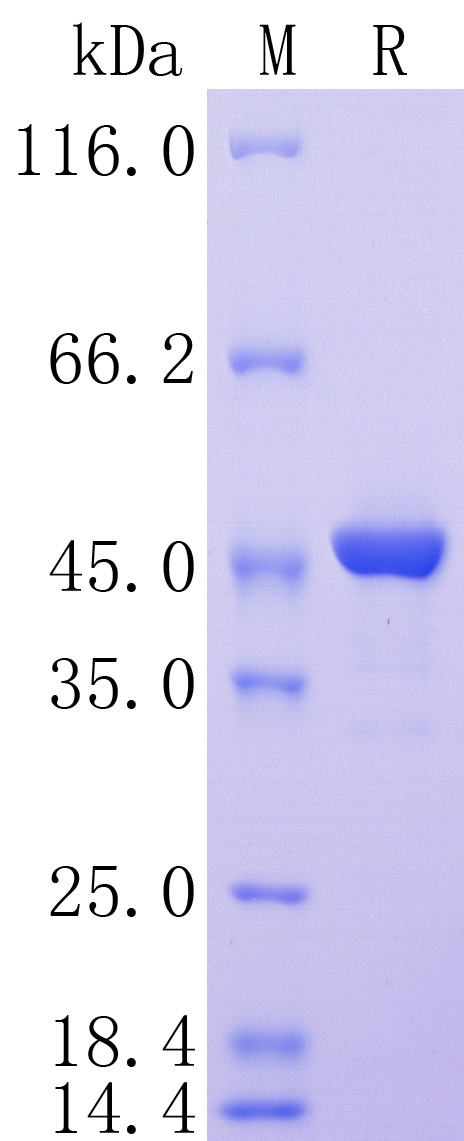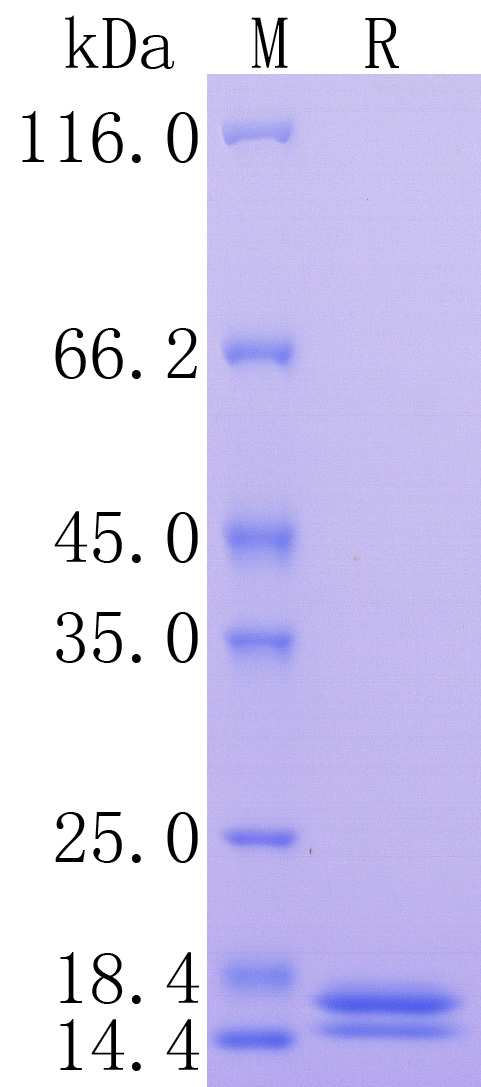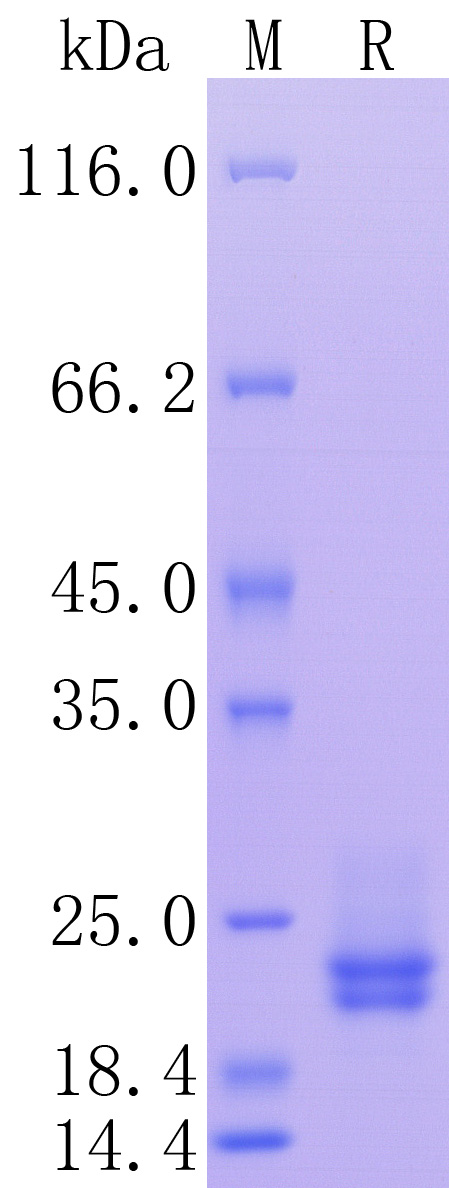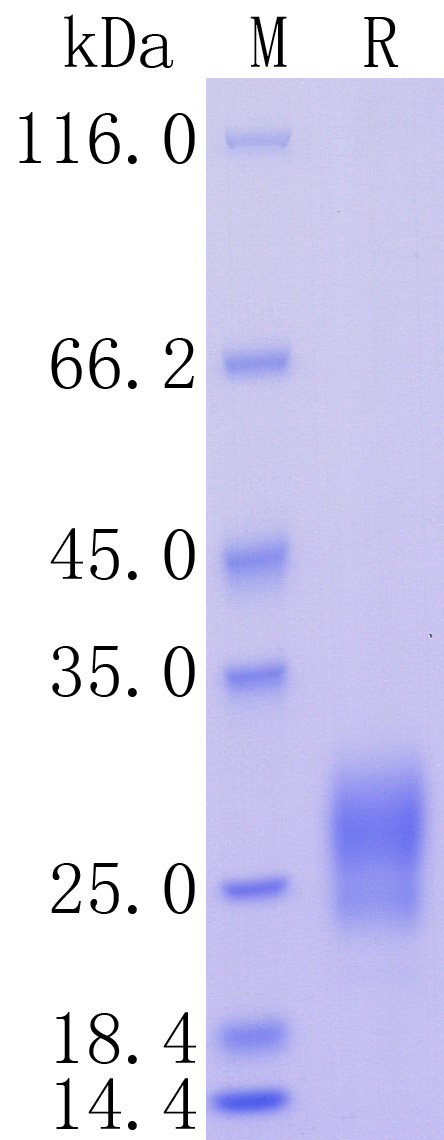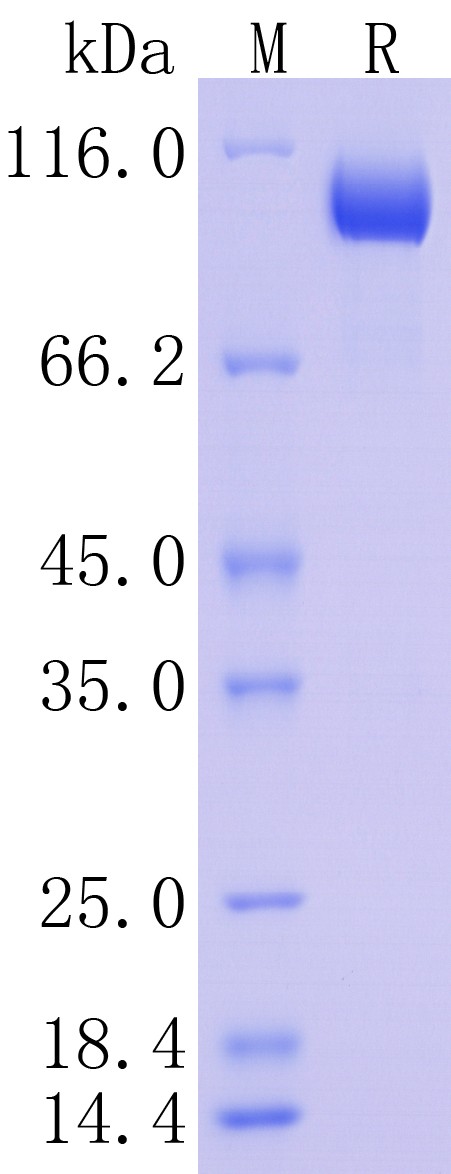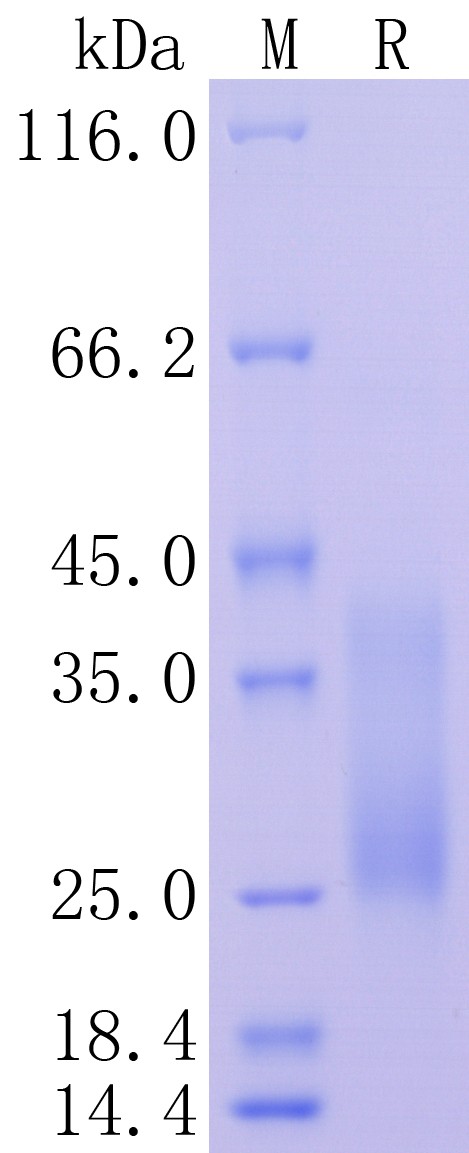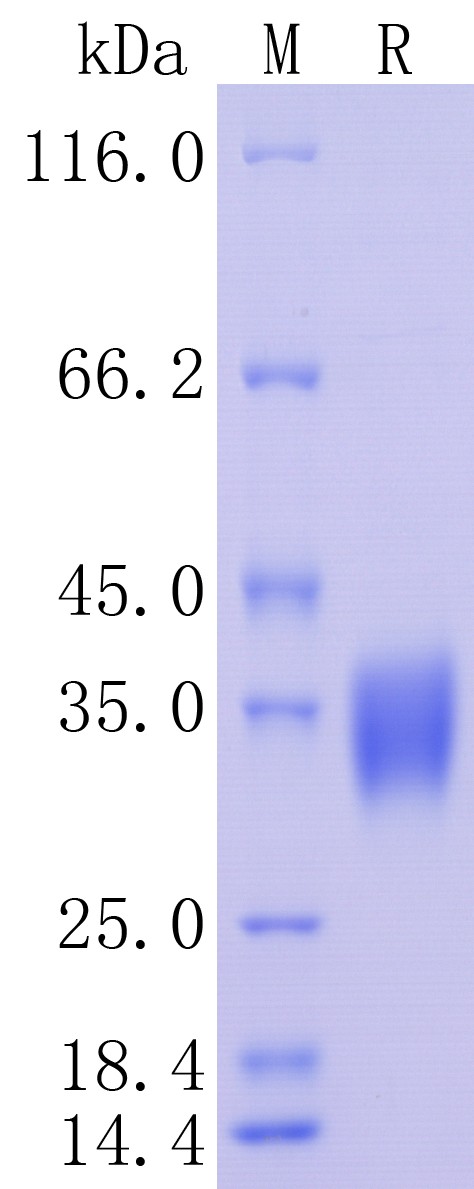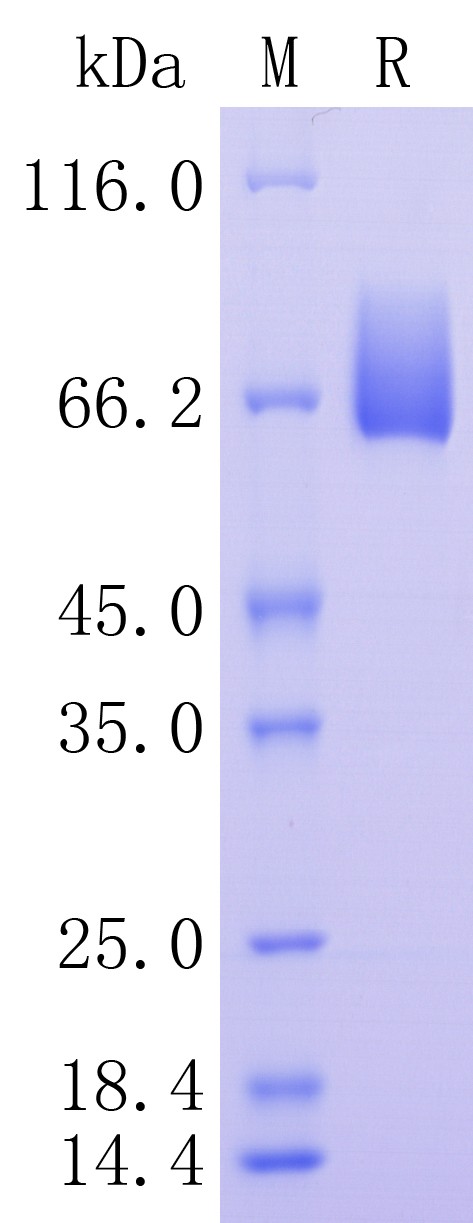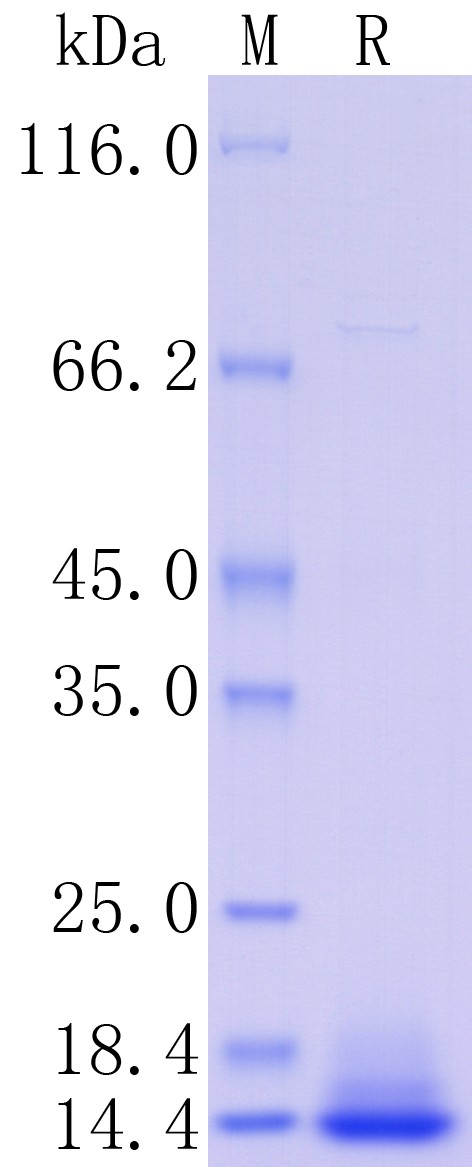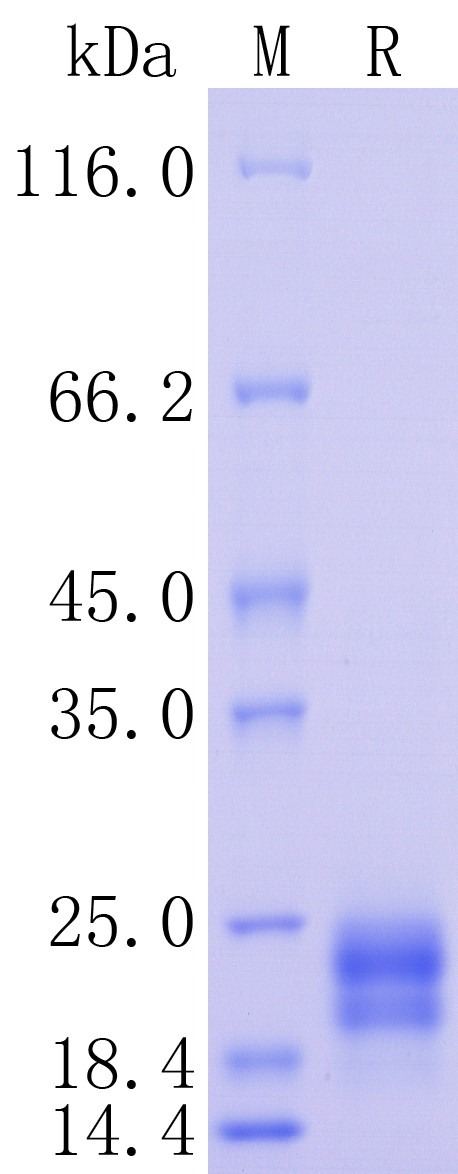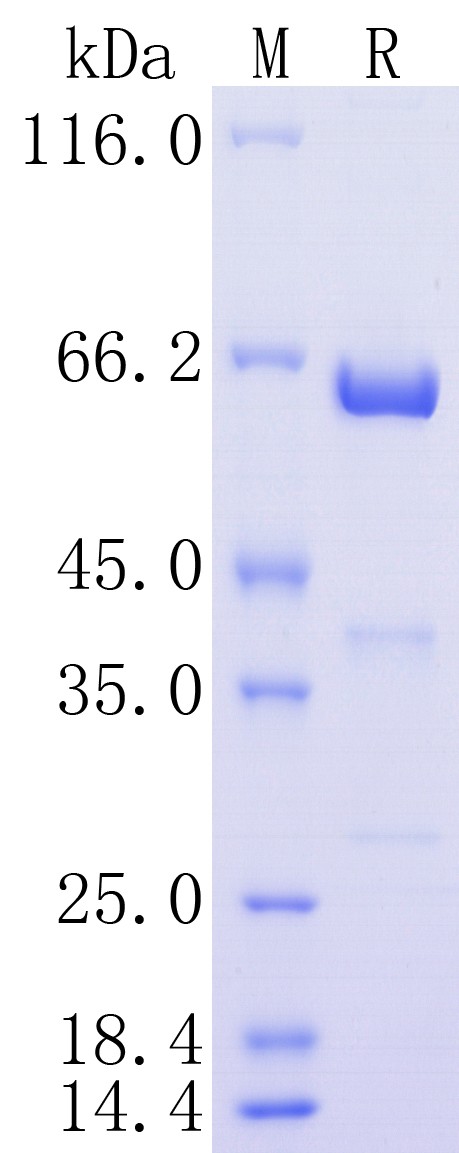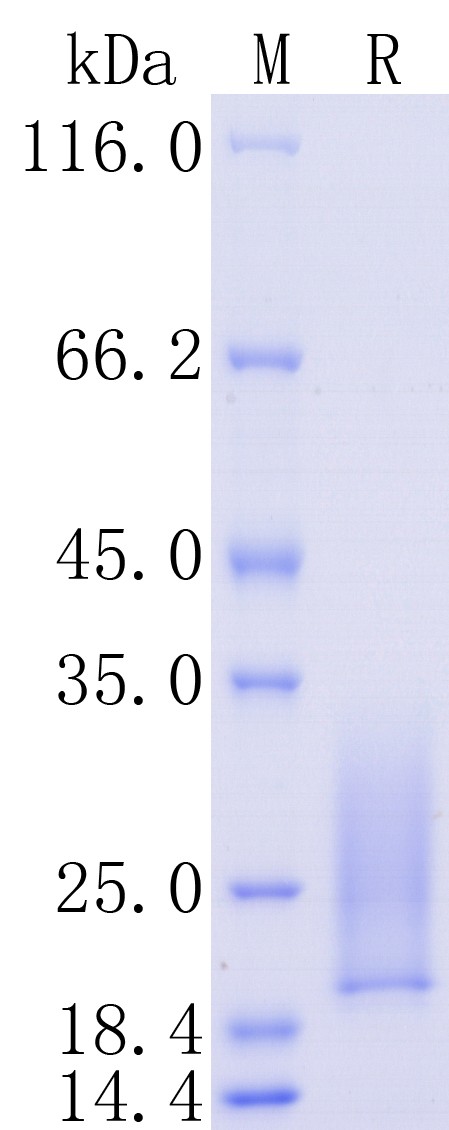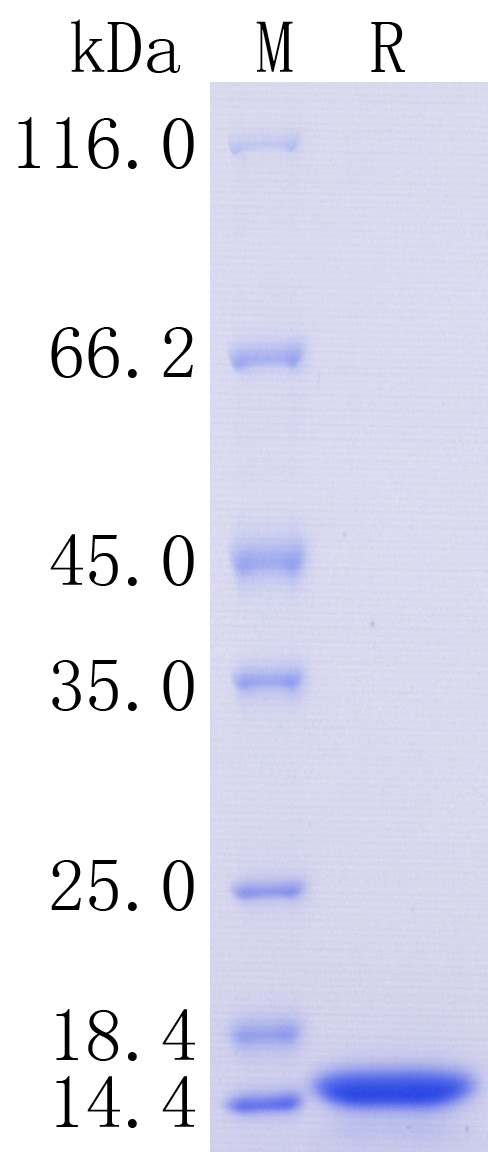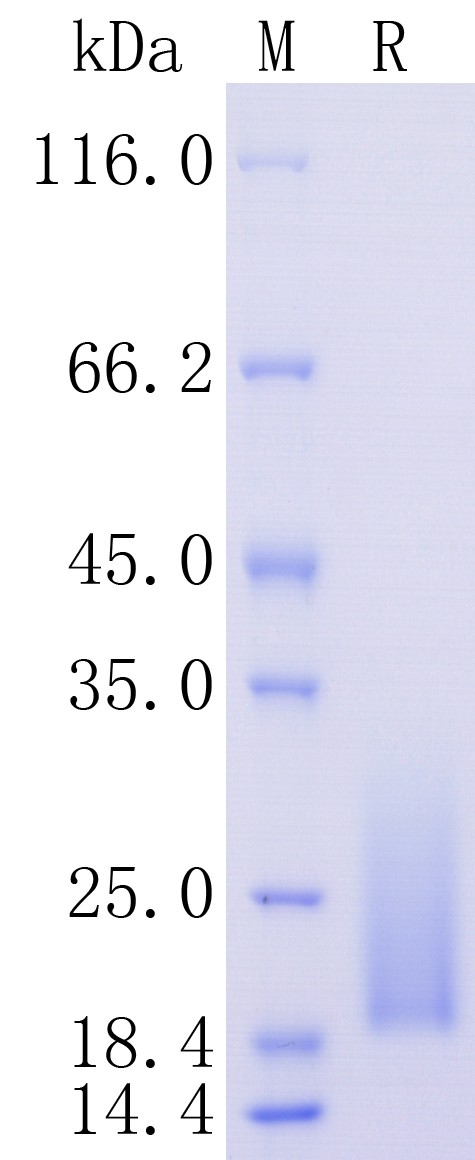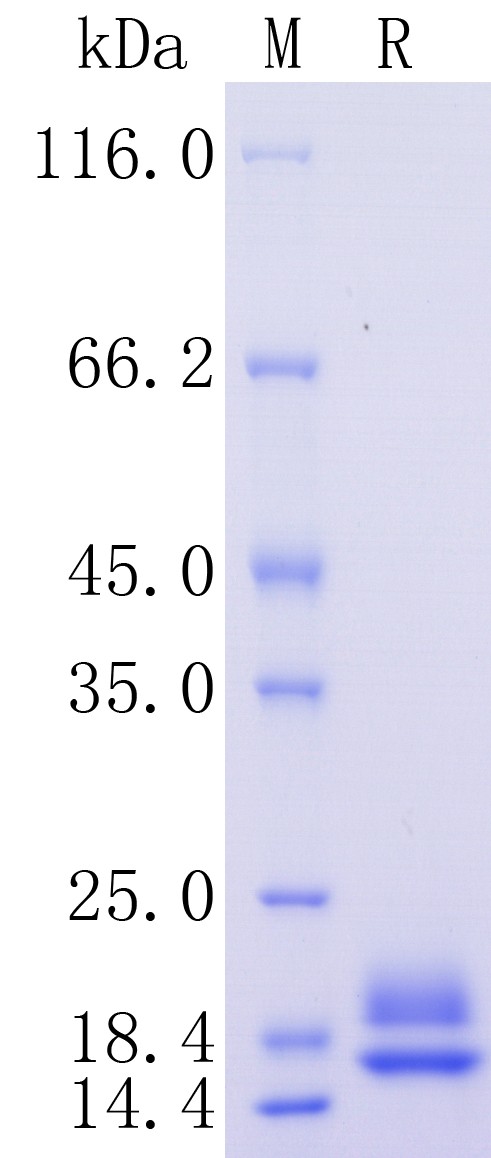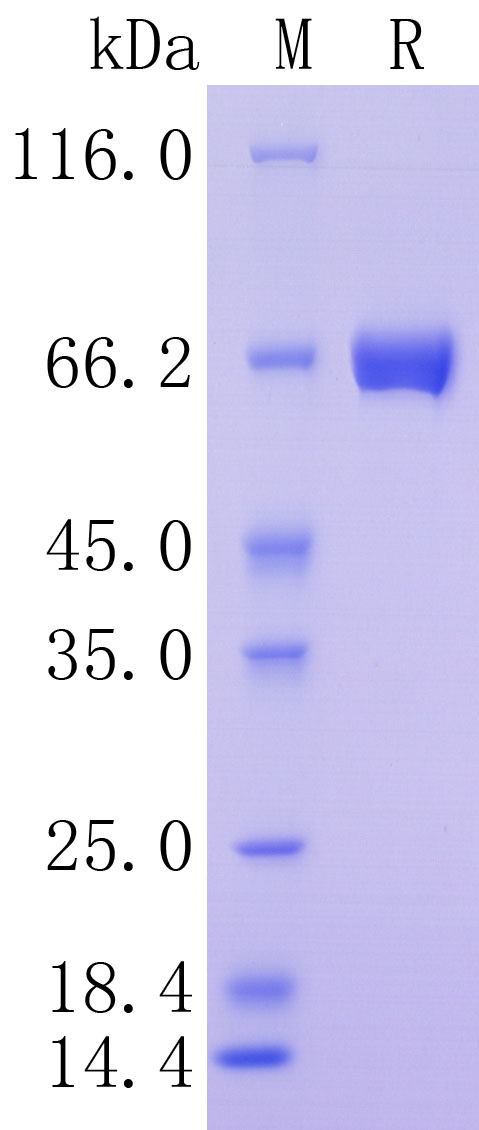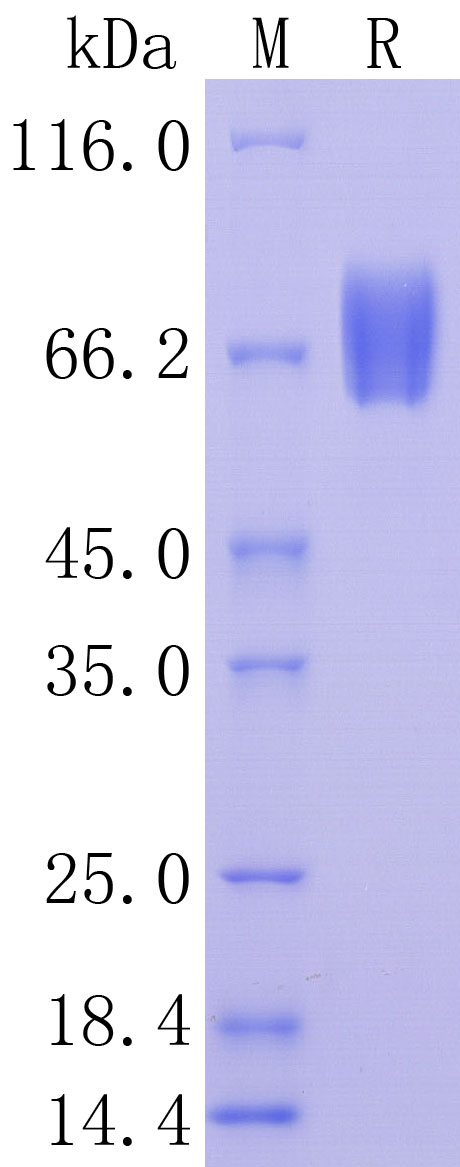Product Information
Product name
Human CXCL10, C-Flag Tag
Catalog No.
HA210740
Predicted molecular mass
10.2 kD
Protein construction description
A DNA sequence encoding the human CXCL10 protein (P02778) (Val 22-Pro 98) was expressed with a Flag tag at the C-terminus.
Accession
P02778
Protein construction
Source
HEK293
Bio Activity
Testing in progress.
Purity
>95% as determined by SDS-PAGE.
Endotoxin
Less than 1.0 EU per μg by the LAL method.
Formulation
Lyophilized from a 0.2 μm filtered solution of PBS, pH7.4, 5% Trehalose, 5% mannitol.
Species
Human
Background
Pro-inflammatory cytokine that is involved in a wide variety of processes such as chemotaxis, differentiation, and activation of peripheral immune cells, regulation of cell growth, apoptosis and modulation of angiostatic effects. Plays thereby an important role during viral infections by stimulating the activation and migration of immune cells to the infected sites. Mechanistically, binding of CXCL10 to the CXCR3 receptor activates G protein-mediated signaling and results in downstream activation of phospholipase C-dependent pathway, an increase in intracellular calcium production and actin reorganization. In turn, recruitment of activated Th1 lymphocytes occurs at sites of inflammation. Activation of the CXCL10/CXCR3 axis also plays an important role in neurons in response to brain injury for activating microglia, the resident macrophage population of the central nervous system, and directing them to the lesion site. This recruitment is an essential element for neuronal reorganization.
Usage guide
Shipping
In general, recombinant proteins are provided as lyophilized powder which are shipped with blue ice. Bulk packages of recombinant proteins are provided as frozen liquid which are shipped with dry ice.
Storage
Please avoid repeated freeze-thaw cycles. Samples are stable for up to twelve months from date of receipt at -20℃ to -80℃ It is recommended that aliquot the reconstituted solution to minimize freeze-thaw cycles.
Reconstitution
Reconstitute at 250 μg/ml in sterile water.
同靶点&同通路的产品
Human CXCL5, Tag Free
Application:
Reactivity: Human
Conjugate:
Human CYLD, C-His Tag
Application:
Reactivity: Human
Conjugate:
Human CEACAM-1/CD66a, C-His Tag (ECD)
Application:
Reactivity: Human
Conjugate:
Human NCAM1/CD56, Tag Free (ECD)
Application:
Reactivity: Human
Conjugate:
Human HGF, Tag Free
Application:
Reactivity: Human
Conjugate:
Human ACE2, C-His Tag (ECD)
Application:
Reactivity: Human
Conjugate:
Human IL-2, C-His Tag
Application:
Reactivity: Human
Conjugate:
Human BAFF/BLyS/TNFSF13B, Tag Free (ECD)
Application:
Reactivity: Human
Conjugate:
Human MAPK12, C-His Tag
Application:
Reactivity: Human
Conjugate:
Human IFN-gamma R1, C-His Tag (ECD)
Application:
Reactivity: Human
Conjugate:
Human CD272/BTLA, C-His, Flag Tag (ECD)
Application:
Reactivity: Human
Conjugate:
Human CD2, C-His, Flag Tag (ECD)
Application:
Reactivity: Human
Conjugate:
Human HVEM/TNFRSF14, C-Flag Tag
Application:
Reactivity: Human
Conjugate:
Human LAIR1, N-Twin Strep, C-His, Flag Tag
Application:
Reactivity: Human
Conjugate:
Human IL2RG/CD132, C-His Tag (ECD)
Application:
Reactivity: Human
Conjugate:
Human MAPK6, C-His Tag
Application:
Reactivity: Human
Conjugate:
Human ICOS Ligand/B7-H2/ICOSLG, C-His Tag (ECD)
Application:
Reactivity: Human
Conjugate:
Human IL-5, C-His Tag
Application:
Reactivity: Human
Conjugate:
Human TRAF3, C-His Tag
Application:
Reactivity: Human
Conjugate:
Human IL-1 alpha/IL1A, C-His, Flag Tag
Application:
Reactivity: Human
Conjugate:
Human cIAP-2/BIRC3, N-Twin Strep, C-His, Flag Tag
Application:
Reactivity: Human
Conjugate:
Human IL-8/CXCL8 Tag Free
Application:
Reactivity: Human
Conjugate:
Human Interferon alpha-2/IFNA2, C-His Tag
Application:
Reactivity: Human
Conjugate:
Human MMP-2/CLG4A, C-His, Flag Tag
Application:
Reactivity: Human
Conjugate:
Human TOPBP1, C-His Tag
Application:
Reactivity: Human
Conjugate:
Human Periostin/OSF-2, C-His, Flag Tag
Application:
Reactivity: Human
Conjugate:
Human IL-1 RII, C-His Tag (ECD)
Application:
Reactivity: Human
Conjugate:
Human IL-22, C-His, Flag Tag
Application:
Reactivity: Human
Conjugate:
Human MMP-9, C-His, Flag Tag
Application:
Reactivity: Human
Conjugate:
Human PRDM1, N-Twin Strep, C-His, Flag Tag
Application:
Reactivity: Human
Conjugate:
Human IL-4R, C-His, Tag (ECD)
Application:
Reactivity: Human
Conjugate:
Human TNF-alpha, Tag Free
Application:
Reactivity: Human
Conjugate:
Human TNF-alpha, C-His Tag
Application:
Reactivity: Human
Conjugate:
Human CXCL9, Tag Free
Application:
Reactivity: Human
Conjugate:
Human IL-18, Tag Free
Application:
Reactivity: Human
Conjugate:
Human VEGF165, Tag Free
Application:
Reactivity: Human
Conjugate:
Human CCL2/MCP1, Tag Free
Application:
Reactivity: Human
Conjugate:
Human CD5, Tag Free (ECD)
Application:
Reactivity: Human
Conjugate:
Human FGF Basic/FGF2, Tag Free
Application:
Reactivity: Human
Conjugate:
Human IL1RA, C-His Tag
Application:
Reactivity: Human
Conjugate:
Human TREM1, C-Hia, Flag Tag
Application:
Reactivity: Human
Conjugate:
Human MMP-3, C-His, Flag Tag
Application:
Reactivity: Human
Conjugate:
Human GHRL, C-His, Flag Tag
Application:
Reactivity: Human
Conjugate:
Human CTLA-4, C-His Tag
Application:
Reactivity: Human
Conjugate:
Human CD31/PECAM-1, C-His Tag
Application:
Reactivity: Human
Conjugate:
Human TRAIL/TNFSF10, C-His Tag
Application:
Reactivity: Human
Conjugate:
Human CCL17/TARC, Tag Free
Application:
Reactivity: Human
Conjugate:
Human IP-10/CXCL10, Tag Free
Application:
Reactivity: Human
Conjugate:
Human CXCL12/SDF-1, Tag Free
Application:
Reactivity: Human
Conjugate:
Human CCL3/MIP-1, Tag Free
Application:
Reactivity: Human
Conjugate:
Human MMP-1, C-Flag
Application:
Reactivity: Human
Conjugate:
Human CXCL2/GRO beta, Tag Free
Application:
Reactivity: Human
Conjugate:
Human Nectin-2, C-His Tag (ECD)
Application:
Reactivity: Human
Conjugate:
Human CD48, C-His Tag
Application:
Reactivity: Human
Conjugate:
Human IL-13, Tag Free
Application:
Reactivity: Human
Conjugate:
Human P-Selectin/CD62P, C-His Tag (ECD)
Application:
Reactivity: Human
Conjugate:
Human Mesothelin/MSLN, Tag Free
Application:
Reactivity: Human
Conjugate:
Human VE-cadherin, Tag Free (ECD)
Application:
Reactivity: Human
Conjugate:
Human IL12B/P40, C-His Tag
Application:
Reactivity: Human
Conjugate:
Human CD27/TNFRSF7, Tag Free
Application:
Reactivity: Human
Conjugate:
Human CD28, C-His Tag
Application:
Reactivity: Human
Conjugate:
Human PD-1, C-His Tag
Application:
Reactivity: Human
Conjugate:
Human LILRB4/ILT3, C-His, Flag Tag (ECD)
Application:
Reactivity: Human
Conjugate:
Human IL-18 BPa, C-His Tag
Application:
Reactivity: Human
Conjugate:
Human Carbonic Anhydrase XII/CA12, Tag Free (ECD)
Application:
Reactivity: Human
Conjugate:
Human IL-17F, Tag Free
Application:
Reactivity: Human
Conjugate:
Human HGF, C-Flag Tag
Application:
Reactivity: Human
Conjugate:
Human CD63, Tag Free (ECD)
Application:
Reactivity: Human
Conjugate:
Human CDC42, Tag Free
Application:
Reactivity: Human
Conjugate:
Human CD207, C-Flag Tag
Application:
Reactivity: Human
Conjugate:
Human ANPEP/CD13, Tag Free (ECD)
Application:
Reactivity: Human
Conjugate:
Human OX40/TNFRSF4, C-His Tag
Application:
Reactivity: Human
Conjugate:
Human G-CSF, C-His Tag
Application:
Reactivity: Human
Conjugate:
Human IL-2R alpha, Tag Free
Application:
Reactivity: Human
Conjugate:
Human CALCA, C-His Tag
Application:
Reactivity: Human
Conjugate:
Human IL-9, C-Flag Tag
Application:
Reactivity: Human
Conjugate:
Human CD2, N-Twin Strep, C-His, Flag Tag
Application:
Reactivity: Human
Conjugate:
Human IL-2RB/CD122, C-His Tag (ECD)
Application:
Reactivity: Human
Conjugate:
Human IL-21, C-His, Flag Tag
Application:
Reactivity: Human
Conjugate:
Human IL-7, C-His, Flag Tag
Application:
Reactivity: Human
Conjugate:
Human CD58/LFA-3, C-His Tag (ECD)
Application:
Reactivity: Human
Conjugate:
Human LILRB2/CD85d/ILT4, C-His, Flag Tag (ECD)
Application:
Reactivity: Human
Conjugate:
Human IFN-gamma, C-His Tag
Application:
Reactivity: Human
Conjugate:
Human CXCL1, Tag Free
Application:
Reactivity: Human
Conjugate:
Human 4-1BB/TNFRSF9, C-His Tag
Application:
Reactivity: Human
Conjugate:
Human Sorcin/SRI, N-Twin Strep, C-His, Flag Tag
Application:
Reactivity: Human
Conjugate:
Human ACP1, C-His Tag
Application:
Reactivity: Human
Conjugate:
Human CSK, C-His Tag
Application:
Reactivity: Human
Conjugate:
Human Mesothelin, C-His Tag
Application:
Reactivity: Human
Conjugate:
Human IMMT/Mitofilin, C-His Tag
Application:
Reactivity: Human
Conjugate:
Human IL-33, C-His Tag
Application:
Reactivity: Human
Conjugate:
Human CASQ2, Tag Free
Application:
Reactivity: Human
Conjugate:
Human TNF RI/TNFRSF1A, Tag Free (ECD)
Application:
Reactivity: Human
Conjugate:
Human IL-1 beta/IL1B, C-His Tag
Application:
Reactivity: Human
Conjugate:
Human IL17RA/CD217, C-His Tag (ECD)
Application:
Reactivity: Human
Conjugate:
Human FGF2/b-FGF, C-His, Flag Tag
Application:
Reactivity: Human
Conjugate:
Human IL1RL1/DER4/ST2, C-hFc, His (ECD)
Application:
Reactivity: Human
Conjugate:
Human B7-DC/PD-L2/CD273, C-Flag Tag (ECD)
Application:
Reactivity: Human
Conjugate:
Human IFN-alpha/beta R2, C-His Tag (ECD)
Application:
Reactivity: Human
Conjugate:
Human Osteoactivin/GPNMB, C-His Tag (ECD)
Application:
Reactivity: Human
Conjugate:
Human HCLS1, N-Strep II, C-His Tag
Application:
Reactivity: Human
Conjugate:
Human IFN-alpha/beta R1, C-His (ECD)
Application:
Reactivity: Human
Conjugate:
Human IL-6, C-His Tag
Application:
Reactivity: Human
Conjugate:
Human IL-6R, C-His (ECD)
Application:
Reactivity: Human
Conjugate:
Human MMP-8/CLG1, C-His, Flag Tag
Application:
Reactivity: Human
Conjugate:
Human CD30/TNFRSF8, C-His, Flag Tag (ECD)
Application:
Reactivity: Human
Conjugate:
Human EPCR/PROCR/CD201, C-His, Flag Tag (ECD)
Application:
Reactivity: Human
Conjugate:
Human CDCP1/CD318, N-Twin Strep, C-His, Flag Tag
Application:
Reactivity: Human
Conjugate:
Human CD200, C-His Tag (ECD)
Application:
Reactivity: Human
Conjugate:
Human IL1RL1/DER4/ST2, C-His (ECD)
Application:
Reactivity: Human
Conjugate:
Human EGF, Tag Free
Application:
Reactivity: Human
Conjugate:
Human IL5RA, C-His Tag (ECD)
Application:
Reactivity: Human
Conjugate:
Human IL-10, C-His Tag
Application:
Reactivity: Human
Conjugate:
Human IL-17A, Tag Free
Application:
Reactivity: Human
Conjugate:
Human GADD45A, N-Twin Strep, C-His, Flag Tag
Application:
Reactivity: Human
Conjugate:
Human RAC1, C-Flag Tag
Application:
Reactivity: Human
Conjugate:
Human IL-4, Tag Free
Application:
Reactivity: Human
Conjugate:
Human CKM, C-His, Flag Tag
Application:
Reactivity: Human
Conjugate:
Human IL-2, Tag Free
Application:
Reactivity: Human
Conjugate:
Human IL-6, Tag Free
Application:
Reactivity: Human
Conjugate:
Human IL-7, Tag Free
Application:
Reactivity: Human
Conjugate:
Human TIE2/TEK, C-His, Flag Tag (ECD)
Application:
Reactivity: Human
Conjugate:
Human HVEM/TNFRSF14, Tag Free (ECD)
Application:
Reactivity: Human
Conjugate:
Human Erythropoietin/EPO, C-His, Flag Tag
Application:
Reactivity: Human
Conjugate:
Human MMP13, C-His, Flag Tag
Application:
Reactivity: Human
Conjugate:
Human MMP-12, C-Flag Tag
Application:
Reactivity: Human
Conjugate:
Human ICAM-1/CD54, C-His Tag (ECD)
Application:
Reactivity: Human
Conjugate:
Human PDGF-B, Tag Free
Application:
Reactivity: Human
Conjugate:
Human CCL11/Eotaxin, Tag Free
Application:
Reactivity: Human
Conjugate:
Human VEGF-C, C-His, Flag Tag
Application:
Reactivity: Human
Conjugate:
Human PD-L1/B7-H1, C-hFc Tag
Application:
Reactivity: Human
Conjugate:
Human E-Cadherin, C-His Tag (ECD)
Application:
Reactivity: Human
Conjugate:
Human 5'-nucleotidase/CD73/NT5E, C-His Tag
Application:
Reactivity: Human
Conjugate:
Human IL-16, C-His Tag
Application:
Reactivity: Human
Conjugate:
Human SAA1, C-Flag Tag
Application:
Reactivity: Human
Conjugate:
Human IL-3, Tag Free
Application:
Reactivity: Human
Conjugate:
Human VEGF121, Tag Free
Application:
Reactivity: Human
Conjugate:
Human IL-31, C-Flag Tag Protein
Application:
Reactivity: Human
Conjugate:
Human ACP3/ACPP, C His, Flag Tag
Application:
Reactivity: Human
Conjugate:
Human A2M/alpha-2-macroglobulin, C-His Tag
Application:
Reactivity: Human
Conjugate:
Human LILRB1/CD85j/ILT2, C-His, Flag Tag (ECD)
Application:
Reactivity: Human
Conjugate:
Human IL12RB1, C-His Tag (ECD)
Application:
Reactivity: Human
Conjugate:



